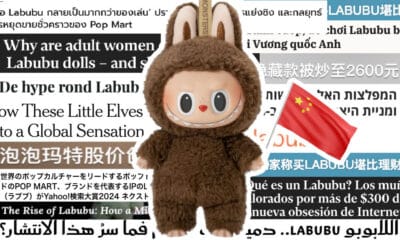China Arts & Entertainment
The Chunwan Liveblog: Watching the 2021 CMG Spring Festival Gala
We’re here to keep you updated about the CMG Spring Festival Gala, China’s biggest New Year’s TV event.
Published
4 years agoon
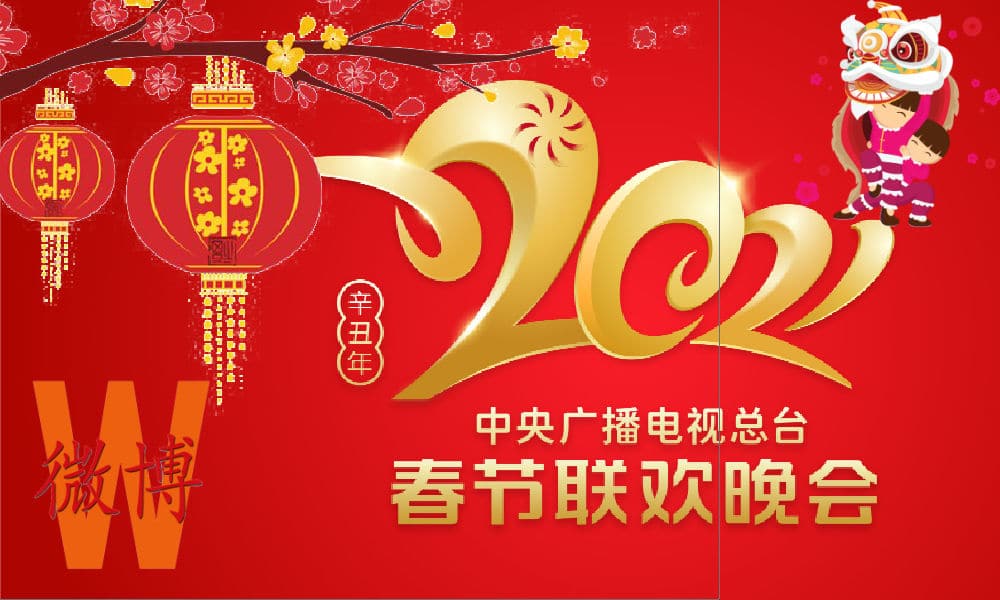
WHAT’S ON WEIBO ARCHIVE | PREMIUM CONTENT ARTICLE
Happy Niu Year! The Lunar New Year is here, and that means millions of Chinese families are watching the annual 4-hour-long live Spring Festival Gala as part of the Chinese New Year celebrations. Watch the event together with What’s on Weibo, as we will liveblog throughout the show. (This event had ended, liveblog is now closed!)
In these turbulent times when everything is changing, there is one thing to count on, and that is the airing of China’s Spring Festival Gala. Despite the pandemic, the 39th edition of the festival will go ahead.
A live-streaming of the Gala will be live on Thursday, February 11, 20.00 pm China Standard Time. Check out this YouTube link, live stream from Weibo, or watch straight from CCTV. We will be live-blogging on this page here.
What Exactly is the ‘Chunwan’ Gala?
China’s CCTV Spring Festival Gala (中国中央电视台春节联欢晚会), commonly abbreviated to chūnwǎn (春晚), is an annual TV gala to celebrate the start of the new year and it is the most-watched show in the world. Although it is known as the CCTV Gala, it is now officially presented as being hosted by “China Media Group” (CMG), the predominant state media company founded in 2018 that holds China Central Television, China National Radio, and China Radio International.
Since its very first airing in 1983, the Spring Festival Gala has captured an audience of millions. In 2010, the live Gala had a viewership of 730 million; in 2014, it had reached a viewership of 900 million, and in 2019, over a billion people watched the Gala on TV and online, making the show much bigger in terms of viewership than, for example, the Super Bowl.
The show lasts a total of four hours and usually has around 30 to 40 different acts, from dance to singing and acrobatics. The acts that are both most-loved and most-dreaded are the comic sketches (小品) and crosstalk (相声); they are usually the funniest, but also convey the most political messages.
As viewer ratings of the CCTV Gala in the 21st century have skyrocketed, so has the critique on the show – which seems to be growing year-on-year. According to many viewers, the spectacle generally is often “way too political” with its display of communist nostalgia, including the performance of different revolutionary songs such as “Without the Communist Party, There is No New China” (没有共产党就没有新中国).
For this same reason, the sentence “There’ll never be a worst, just worse than last year” (“央视春晚,没有最烂,只有更烂”) has become a well-known idiom connected to the Gala.
If you want to know more about the previous editions, we also live-blogged
– 2020: CCTV New Year’s Gala 2020
– 2019: The CCTV Spring Festival Gala 2019 Live Blog
– 2018: CCTV Spring Festival Gala 2018 (Live Blog)
– 2017: CCTV New Year’s Gala 2017 Live Blog
– 2016: CCTV’s New Year’s Gala 2016 Liveblog
Liveblog CCTV Gala 2021
——–
The original liveblog was done via a third-party app. The original texts and images are copied below for reference. The timestamp refers to the last moment that post was updated.
——–
What can we expect?
Feb 11 17:07
The show is starting a couple of hours from now, what can we expect?
The Spring Festival Gala usually always focuses on the themes that matter to Chinese authorities, as the event is an important moment to communicate official ideology. The themes and topic that will matter this year are the following:
– China’s battle against COVID19
– the Chinese Communist Party marks its 100th anniversary
– China’s eradication of poverty
– The upcoming Winter Olympics
These themes are likely to come up in various acts, or in the public service announcement or special moments throughout the show. Tonight, there will be a total of 36 acts including songs, dance acts, skits, acrobatics, martial arts, and some magic.
——–
What Is Weibo Anticipating Most Tonight?
Feb 11 19:15
Just an hour to go before the Gala will start! On Weibo, there are various hashtags related to the Gala, including “Chunwan Year of the Ox” (#牛年春晚#), which is already up to 270 million views at this point.

People look most forward to seeing the super popular Wang Yibo on stage, which will be in the early parts of the Gala. People also look forward to seeing Chinese top actress Yang Mi, she will be performing together with Chinese actor Liu Ye in one the show’s final acts. Then there’s the appearance of former ‘Supergirl’ star Li Yuchun, who will appear in a fashion show act that many look forward to.

We also look forward to seeing a skit that is titled “Pressured into Marriage Every Year.” Then of course, there will be the inevitable performance by Jackie Chan that always leads to some online discussions. We’re also curious to see that fashion show that highlights Chinese fashion using hologram technology.
——–
Starting in 5 Minutes!
Feb 11 19:59
Are you ready? Make sure you watch the live stream here or on YouTube here. Turn on the sound – you’ll hear pings coming up when we add an update to comment on the show throughout the night.
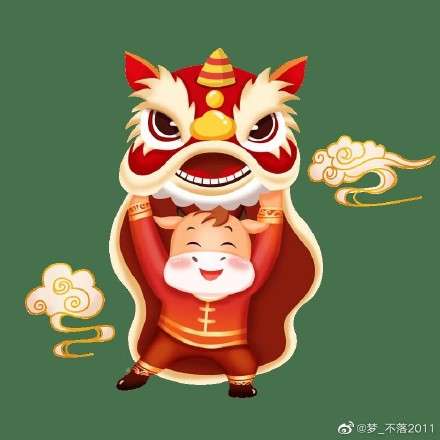
——–
Opening Dance
Feb 11 20:03
And…it’s begun! This first act of the night is a singing and dancing act titles “Best Wishes” (“万事如意” wàn shì rú yì – a Chinese idiom that means ‘may all your hopes be fulfilled.’)
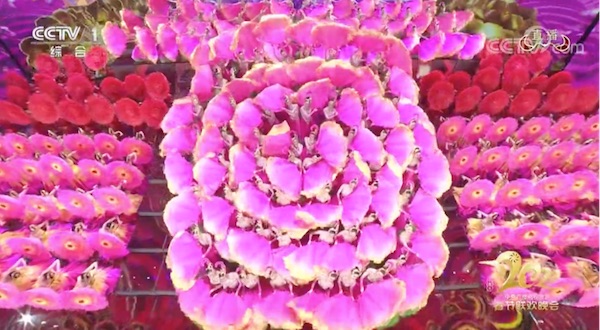
This acts opens with some famous names (although there will be famous names throughout the show). The very pretty Tong Liya 佟丽娅 is an actress and dancer who was born in Xinjiang, she is of the Xibo ethnicity. William Chan Wai-ting is famous a Hong Kong singer, dancer and actor. We also see the actress Jiang Shuying on stage, also known as Maggie Jiang.
Performed by: Tong Liya 佟丽娅, Chen Weiting 陈伟霆 (Hong Kong), Jiang Shuying 江疏影, Du Jiang 杜江, Ouyang Nana 欧阳娜娜 (Taiwan), Long Zilan 龙紫岚 (Macau).
Updated with video link:
——–
Hosts of Chunwan 2021
Feb 11 20:06
Tonight’s hosts are Ren Luyu (任鲁豫), Li Sisi (李思思), Nëghmet Raxman (尼格买提), Long Yang (龙洋), and Zhang Tao (张韬).
Ren Luyu (1978) is a Chinese television host from Henan, and he has presented the Gala many times before (2010, 2016, 2018, 2019) so he is a very familiar face to the show.
Nëghmet Raxman (1983) is a Chinese television host of Uyghur heritage who also is not a newcomer; he hosted the Gala since 2015.
Li Sisi (1986) is a Chinese television host and media personality most known for her role as host of the Gala since 2012.
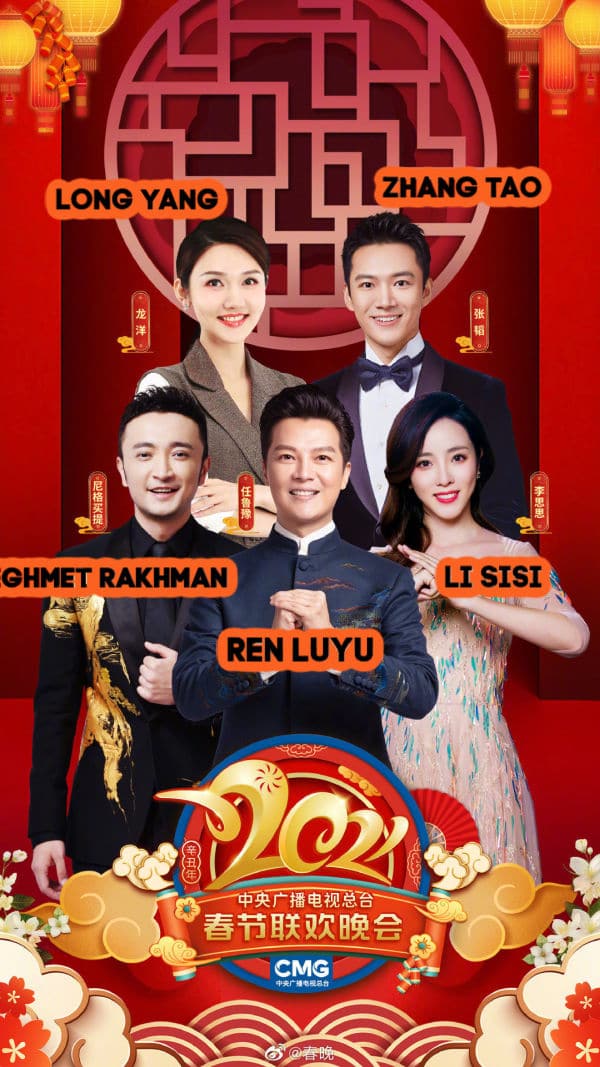
Then there are also two ‘newcomers.’ Long Yang (1989) is the youngest presenter tonight. Born in Hunan’s Chenzhou, she’s been working in Chinese state media for years. As a host, she’s done various big events before, but 2021 is the first time for her to host the CMG Spring Festival Gala.
Also for Zhang Tao (1988?) it is going to be the first time to present the show. Zhang currently hosts the CCTV4 China News and previously worked at Chongqing TV.
——–
Song and Dance “Holiday”
Feb 11 20:12
This act is called Holiday (节日), and includes African, Egyptian, Spanish, Russian, and Chinese influences.
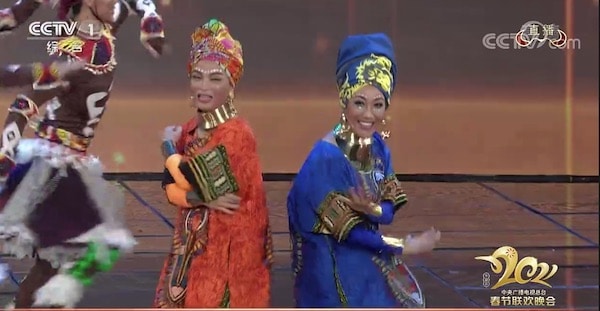
There are some famous people involved in this act, such as the 70-year-old singer Zhu Mingying (朱明瑛) and the Chinese actor Zhang Han (张翰).
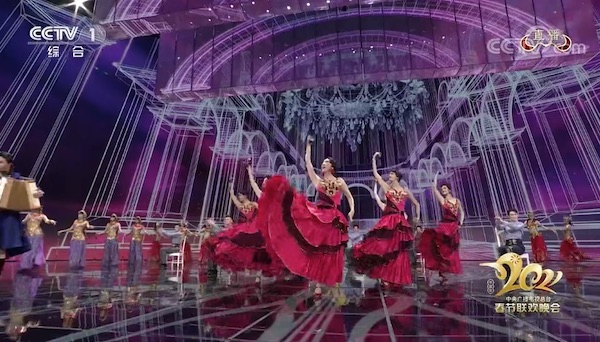
Updated with video link:
Link to video of this performance.
——–
Tech Innovation at the Gala
Feb 11 20:16
The Gala is always a time to showcase China’s innovative digitalization. This year, the Gala is also called a “tech innovation event,” which, for the first time, will use 8K ultra high-tech definition video and AI+VR studio technologies.
The event also features the innovative use of super high definition cloud communication technology to coordinate performances on stage.
As reported by CCTV, some actors who are not in the Chinese mainland and aren’t able to perform live due to the COVID-19 pandemic will still be “on stage”; the cloud technology allows actors who can’t be physically present during the live performances to participate via prerecorded videos while also remotely interacting with the audience.
Chinese state media have been announcing the tech integrated in the show, calling it “a breakthrough in new media communication.” It’s all about 4K, 5G, AR, AI, 3D, and 8K!
This year, the Gala is cooperating with the Douyin app for its ‘hongbao’ (red envelope) activities.
——–
Yue Yunpeng & Sun Yue Crosstalk
Feb 11 20:26
This is the first xiangsheng of the night. Xiangsheng (相声), or ‘crosstalk,’ is a dialogue between actors with rich puns and word jokes, that usually sees two actors with one playing the “joker” and the other playing the “teaser. ”
On stage, we see Chinese actor Yue Yunpeng (1985), who is particularly known for his xiangsheng performances, together with well-known Beijing-born comedian Sun Yue (1979). This is a famous duo, they’ve previously also performed together at the Gala.
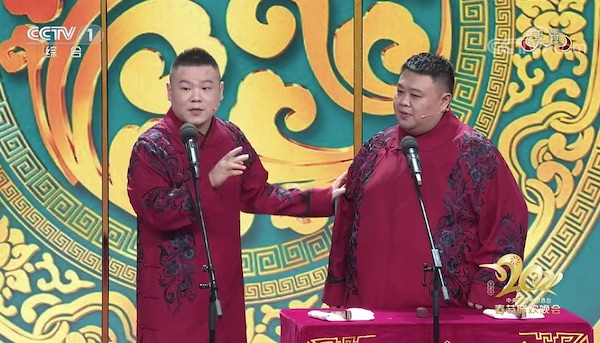
The two are looking back at the songs that have appeared at the festival throughout the years – all songs that the audience can sing together with them.
Updated with video link:
Link to video of this performance.
——–
Chinese New Year Face Masks
Feb 11 20:22
Today’s event is taking place with an audience attending, as every year. This is also possible due to China’s super strict COVID19 measures and requirements.
What is noteworthy is the masks worn by every audience member – they are special Year of the Ox Spring Festival face masks made by the China Media Group for this occasion. How very 2021.
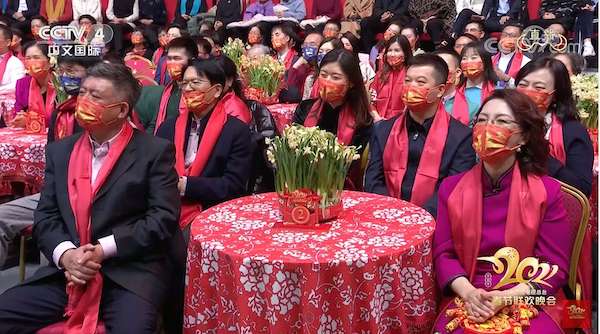
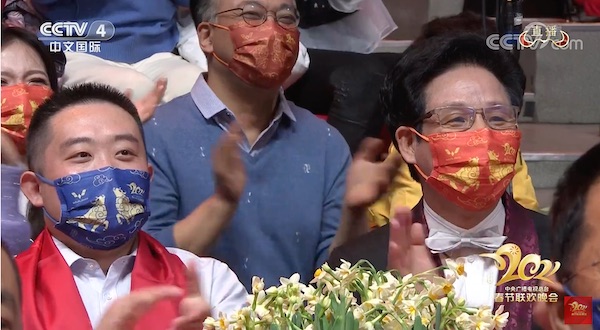
——–
Traditional Jokes
Feb 11 20:29
Some jokes just never get old.. like this one, that also surfaced on Chinese social media last year.
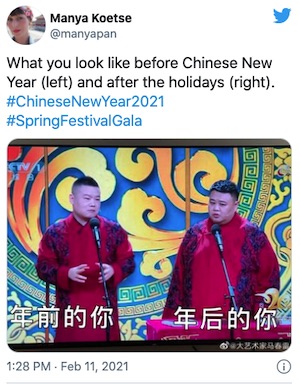
——–
Andy Lau, Wang Yibo, Guan Xiaotong “Niu Qilai”
Feb 11 21:59
OMG! Robot ox, virtual ox, 3D ox – Year of the Ox in China’s digital era!
Here comes Andy Lau, one of Hong Kong’s most famous actors. But it’s probably not Andy that most people are excited about now – it’s Wang Yibo, one of Weibo’s most influential celebrities of the moment.
Talking about the most-anticipated act of this night, it’s actually Wang Yibo according to social media users – there was an online poll on who they want to see most tonight.
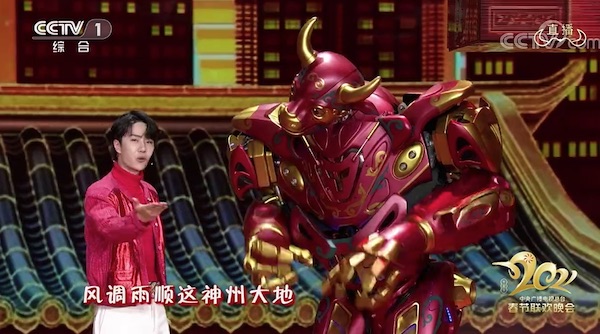
Wang Yibo (1997) is a Chinese actor, singer, dancer, and rapper who debuted as a member of the South Korean-Chinese boyband UNIQ in 2014 and starred in the 2019 Chinese TV series The Untamed (陈情令). On Sina Weibo, the celebrity was the champion of Weibo’s ‘Most Influential Celebrity’ charts recently – he really has a huge online fanbase.
Also performing here is Beijing actress Guan Xiaotong (1997), who is also known as the ‘national daughter’ for always playing the daughter roles in tv-series and movies. Remember that time when Weibo servers were down due to a celebrity relationship announcement? That was about Guan and her relationship with Chinese singer and actor Lu Han.
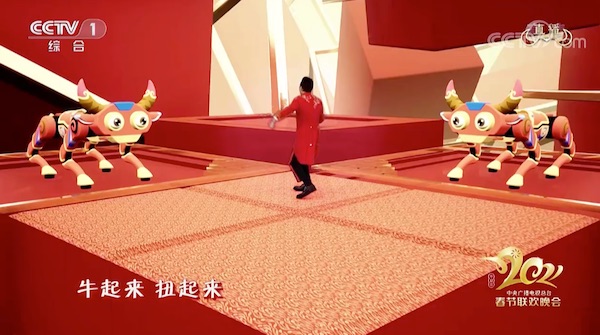
I'm already content and we're only 35 minutes in. There were not just robots. There were dancing robots. Ox robots. #Chunwan2021 #ChineseNewYear2021 pic.twitter.com/EEhhMTzwnE
— Manya Koetse (@manyapan) February 11, 2021
Updated with video link:
——–
Martial Arts Meet High Tech
Feb 11 20:47
This act is titled “Heroes of Heaven and Earth” (天地英雄) and uses AR technology to integrate nature landscapes into martial arts scenes.
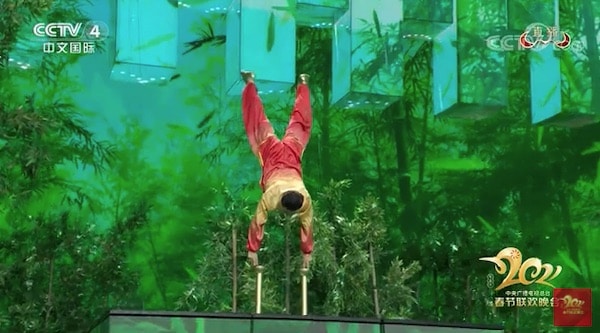
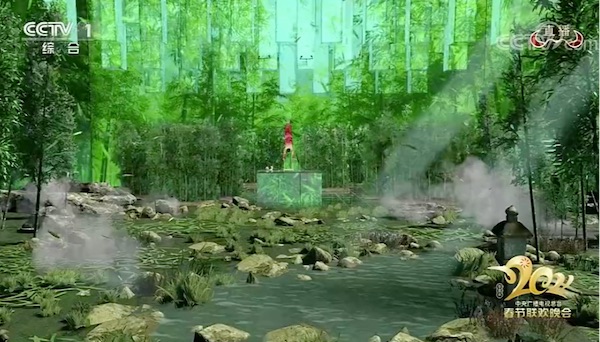
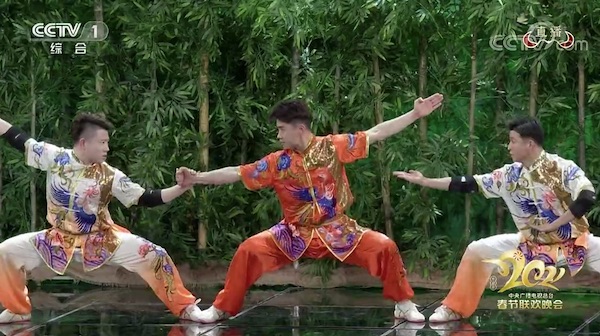
And then there’s this performer who is hanging by her hair that is causing some discussion online:
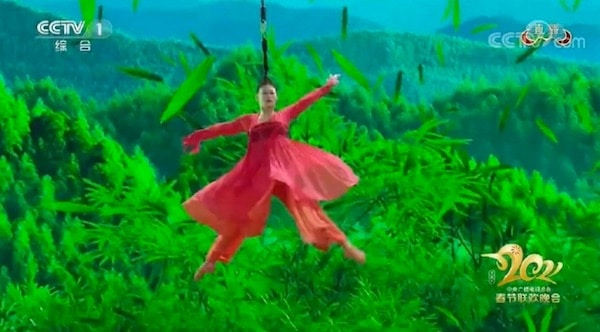
em>Updated with video link:
Link to video of this performance
——–
“How come Andy Lau never gets old?!”
Feb 11 20:43
Meanwhile, on Chinese social media, netizens are discussing why it seems that everyone is getting older except for actor Andy Lau, who performed in the act before this. Andy Lau was born in the Year of the Ox and he’s 60 years old!
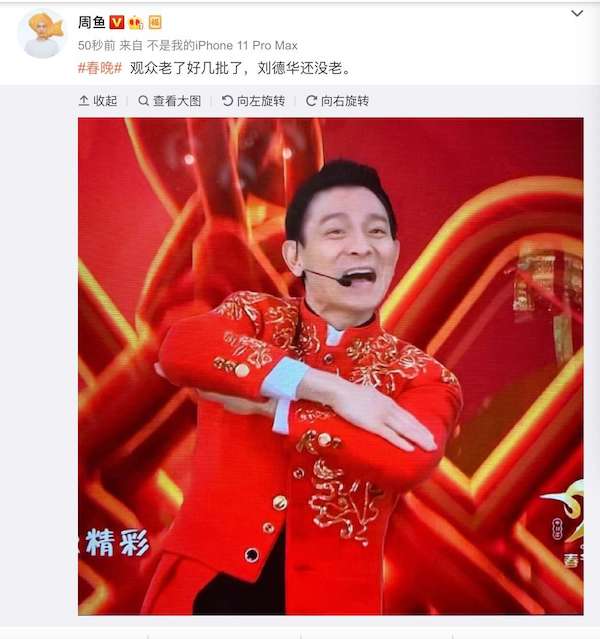
Fun fact: all of the performers in that act, namely Andy Lau, Guan Xiaotong, and Wang Yibo were all born in the Year of the Ox.
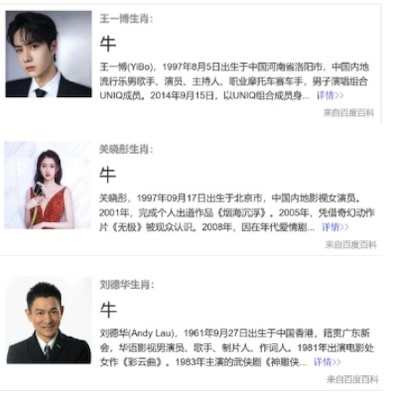
——–
The 2021 Theme and Director
Feb 11 20:50
While we are into the sixth act of the night, let’s look at the theme and director of this show for a second.
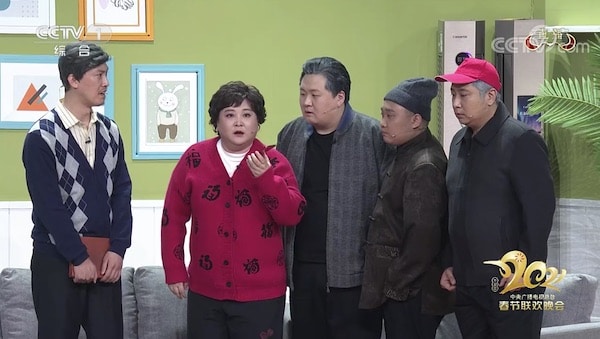
After themes such as “New China”, “Chinese Dream”, “National Unity”, “Family Affinity”, and “Chinese values, Chinese power,” this year’s theme is focused on reflecting the daily lives of ordinary people.
Due to COVID19, this is also a special edition of the festival. Usually, it takes place from various locations with different hosts across China. This year, that is not the case.
This year’s chief director is Chen Linchun (陈临春). After the Guangdong director Yang Dongsheng (杨东升) directed the CCTV Gala in 2017, 2018, and 2020, it’s a different chief director for a change, but Chen is definitely no stranger to the Gala. He previously directed the event in 2008 and 2011 and was also closely involved in the production before.
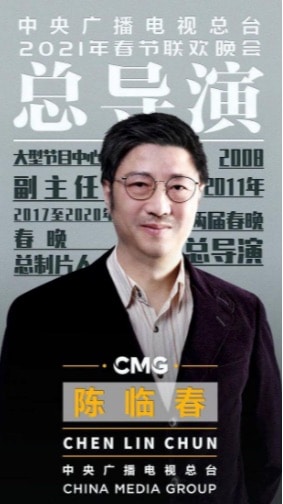
The Gala is always completely rehearsed multiple times before the live show. The fifth rehearsal of the Gala took place on Tuesday.
——–
New Social Media Traditions are Born
Feb 11 22:00
It's a Chinese social media tradition already: compare the opening of the #SpringFestivalGala to your favorite food. Here's the 2021 edition. #ChineseNewYear2021 pic.twitter.com/c6lcLaMe5E
— Manya Koetse (@manyapan) February 11, 2021
Another “new tradition” is online shopping while watching the festival.
In case you like the sweater the actress in the #SpringFestivalGala is wearing now, it's on Taobao (of course!). (Every year, Taobao does very well when people go crazy for items worn during the show.) pic.twitter.com/J5ntqYX0BN
— Manya Koetse (@manyapan) February 11, 2021
Weight jokes are just part of the deal during #SpringFestivalGala. If you're a returning performer on the show, netizens will be quick to compare your looks to previous years… and point out you gained weight! pic.twitter.com/OmRE8x3fcm
— Manya Koetse (@manyapan) February 11, 2021
——–
“Running Youth”
Feb 11 21:03
This song is called “Running Youth” (奔跑的青春), performed by many well-known faces.
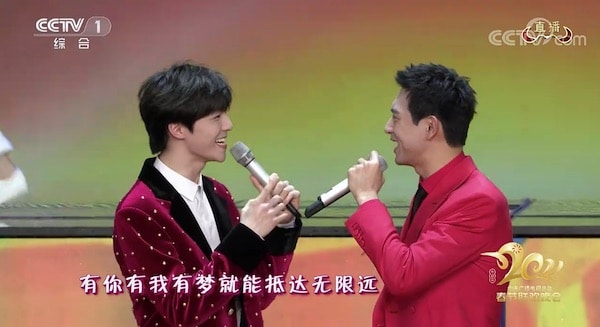
One of them is the popular Dilraba Dilmurat 迪丽热巴, a young Chinese actress of Uyghur ethnicity.
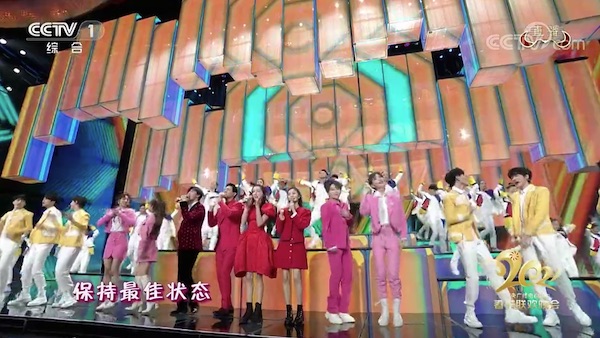
em>Updated with video link:
Link to video of this performance
——–
Special Program: “Report to the Motherland”
Feb 11 21:10
This special part of the show invites Chinese space experts to tell the story of spaceflight, and there will be representatives of the “2020 Poverty Alleviation Award” to shortly address China’s anti-poverty efforts.
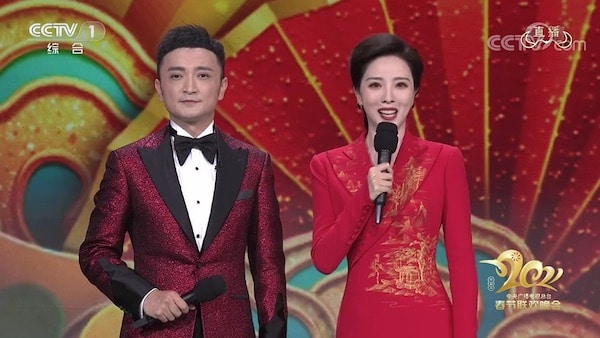
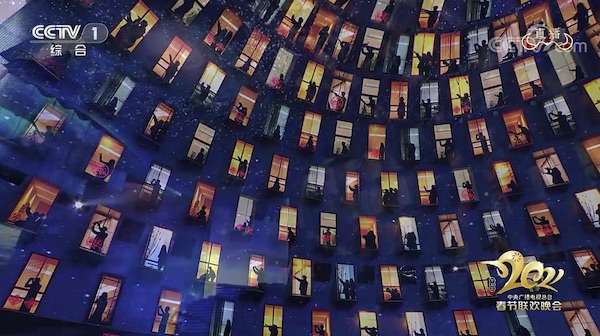
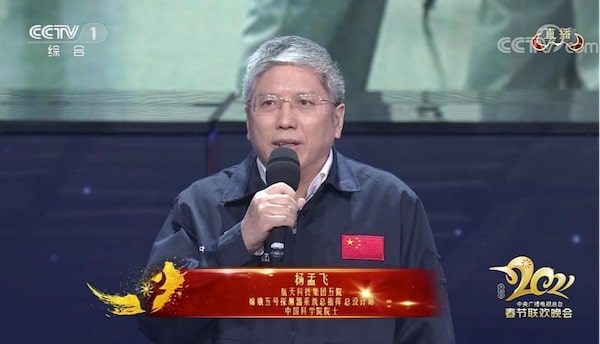
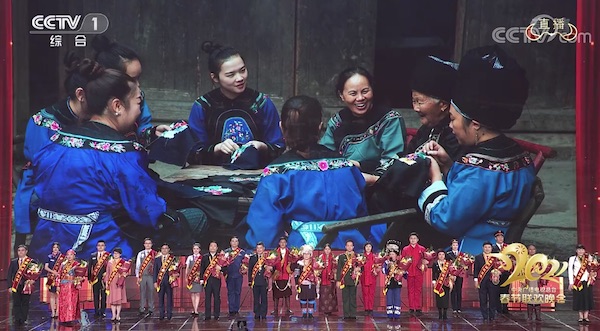
em>Updated with video link:
Link to video of this performance
——–
Andy Lau became a meme already
Feb 11 21:08
Meanwhile.. on Weibo, the actor Andy Lau who performed earlier tonight seems to have become a meme, with people sharing this segment of the song that wishes everyone a prosperous New Year. Gōng xǐ fā cái!
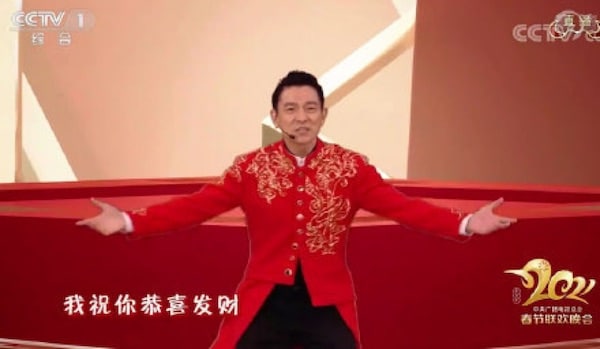
——–
“The Road of Pursuing Dreams,” Performed by Han Hong
Feb 11 21:14
This song titled “The Road of Pursuing Dreams” (追梦之路) performed by Han Hong (韩红), a famous singer and songwriter of mixed Han and Tibetan ethnicity. She became a topic of banter on social media for earlier performances during the Chunwan that were a bit awkward.
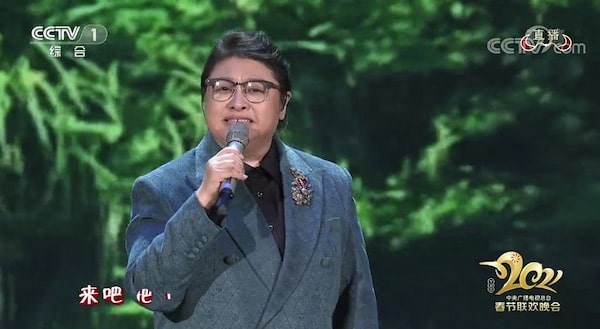
Updated with video link:
Link to video of this performance
——–
Beautiful Jasmine Dance
Feb 11 21:19
This dance is called “Jasmine” (茉莉) with the lead dancer Meng Qingyang and performance by the China Oriental Performing Arts Group.
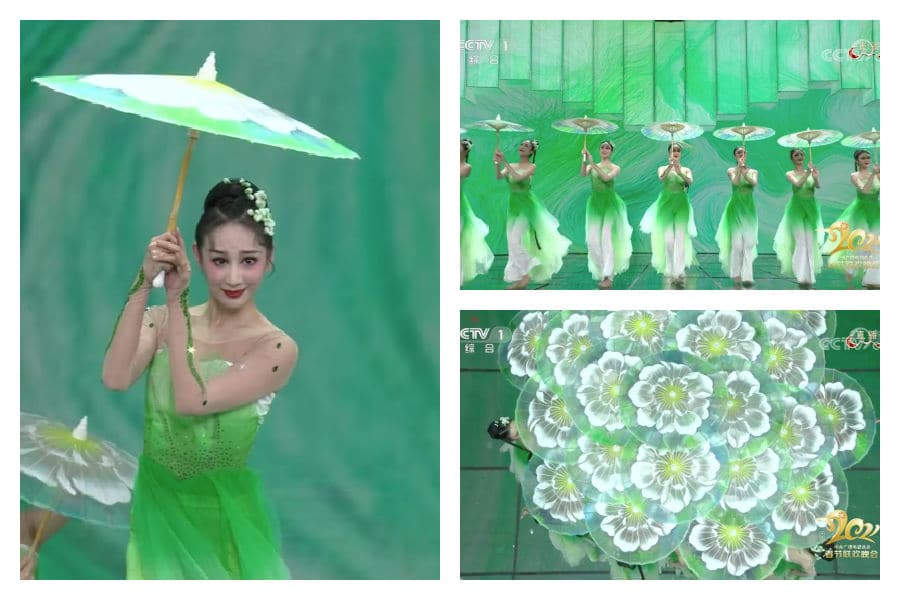
Updated with video link:
——–
(Act 10) Skit: “Balcony”
Feb 11 21:38
This skit was among one of the more anticipated performances tonight. It is focused on the early days of the epidemic in China and how to overcome hardships.
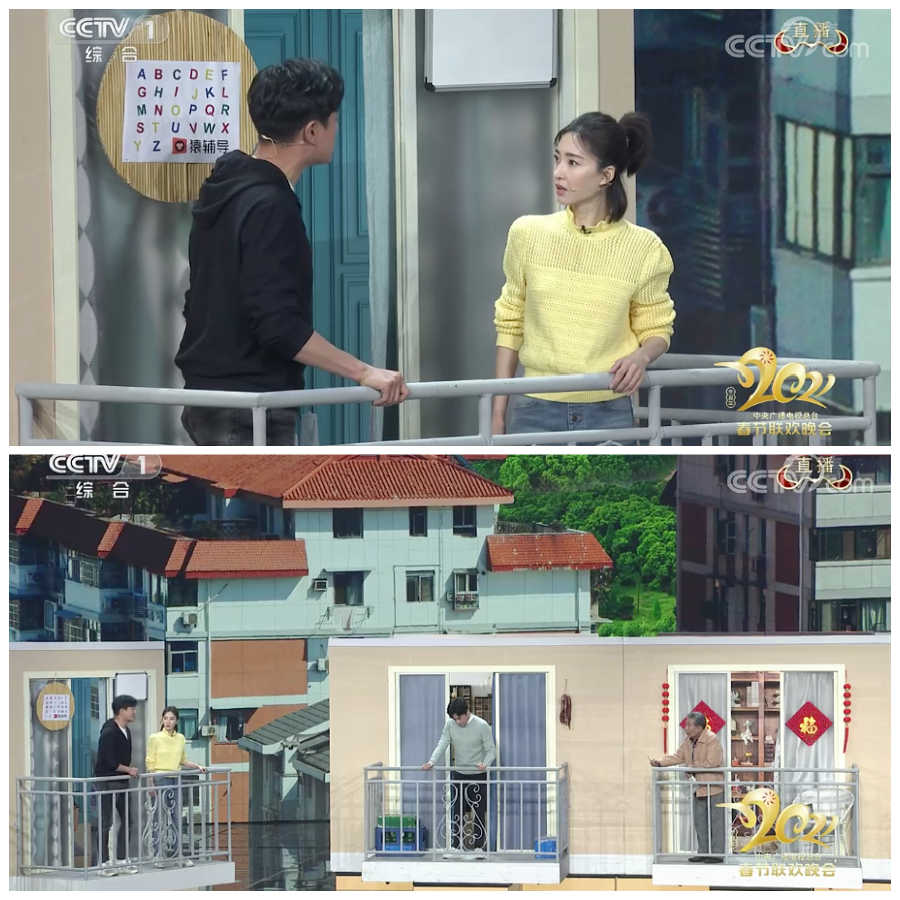
The skit is about people during the lockdown who are worried about family members working on the frontlines. Neighbors use drones to pass on food.
The end of the lockdown is then lifted (looking back on April 2020), which is celebrated. The Gala switches to scenes of Wuhan and real frontline workers.

Updated with video link:
Link to video of this performance
——–
“Tomorrow Will Be Better”
Feb 11 21:46
This song, titled “Tomorrow Will Be Better” (明天会更好) is a clear reference to the pandemic and it is sung by, among others, Jackie Chan! It continues on the same stage and in the same setting as the skit before this.
Jackie Chan (成龙) has become an annually returning performer at the CCTV Gala. Although his performances are always much-anticipated, they’ve also been pretty cringe-worthy. In 2017, the song performed by Jackie that was simply titled “Nation” was met with criticism for being overly political. In 2018, the Hong Kong martial artist sung a song that was called “China” and in 2019 he performed ‘My Struggle, My Happiness.’
We also see Zhu Yilong on stage, a Chinese actor born in 1988. He was voted as one of the actors that Chinese social media users were looking forward to see most at tonight’s Gala.
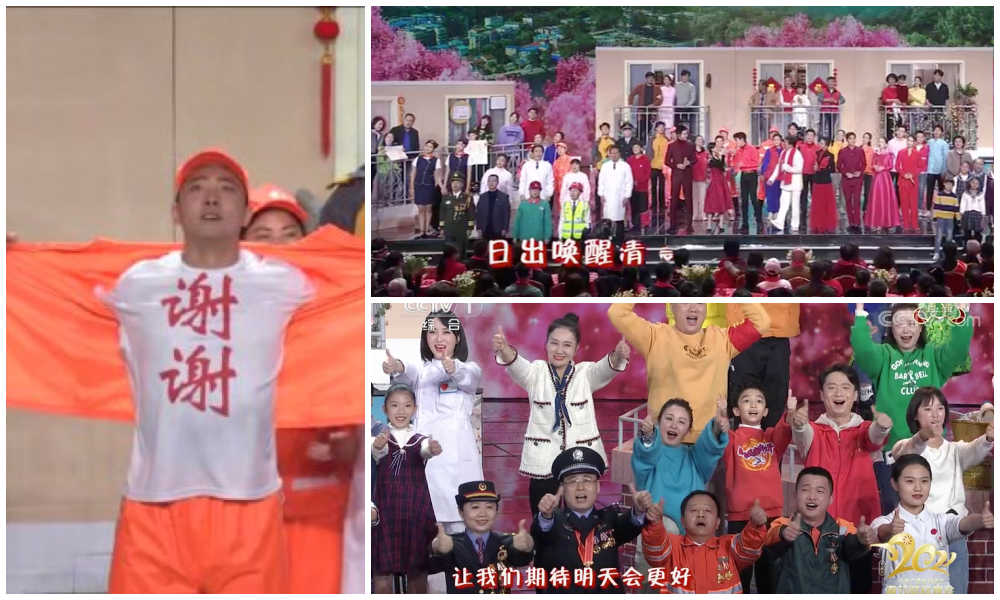
(Picture above shows performer with “thank you” on this shirt). Many netizens say they are moved to tears by this song and the memory of everything that happened last year during the early days of the outbreak in Wuhan.
Updated with video link:
——–
The “Tomorrow Will Be Better Song” Moved Many to Tears
Feb 11 21:48
Many people on Weibo say they are moved to tears by the "Tomorrow will be better" song that is focused on the pandemic, and the memory of everything that happened last year during the early days of the outbreak in Wuhan. It honors frontline workers. #SpringFestivalGala pic.twitter.com/92juCfcdO1
— Manya Koetse (@manyapan) February 11, 2021
——–
“China in the Lights”
Feb 11 21:51
The Gala is moving fast! “China in the Lights” (灯火里的中国) preceded the skit that is now on stage, and it was sung by Chinese singers Zhang Ye (张也) and Zhou Shen (周深, also known as Charlie Zhou), accompanied by performers from the Evergrande Folk Song and Dance Troupe and others.

em>Updated with video link:
Link to video of this performance
——–
Spring Cleaning (大扫除)
Feb 11 21:57
This performance is called ‘Spring Cleaning’ (大扫除), referring to the custom of cleaning the house before the Chinese New Year – a way of driving away the bad luck of the previous year to allow for a new start.

Performing here are Sun Tao (孙涛), Wang Xun (王迅), Qin Hailu (秦海璐), Huang Zitao (黄子韬). The skit makes fun of Chinese bureaucracy.
This skit is especially noteworthy because Chinese singer-songwriter, rapper, actor, and model Huang Zitao is in it. He became super popular as a former member of the South Korean-Chinese boy band Exo and its Chinese sub-unit, Exo-M.

Updated with video link:
Link to video of this performance
——–
FASHION SHOW
Feb 11 22:20
This fashion show (山水霓裳) takes place around Li Yuchun’s solo performance, and it highlights the beauty of Chinese costumes in a new way. As state media previously reported, the fashion show uses split-screen shooting and hologram technology to show the beauty of Chinese costumes to “demonstrate cultural confidence.”
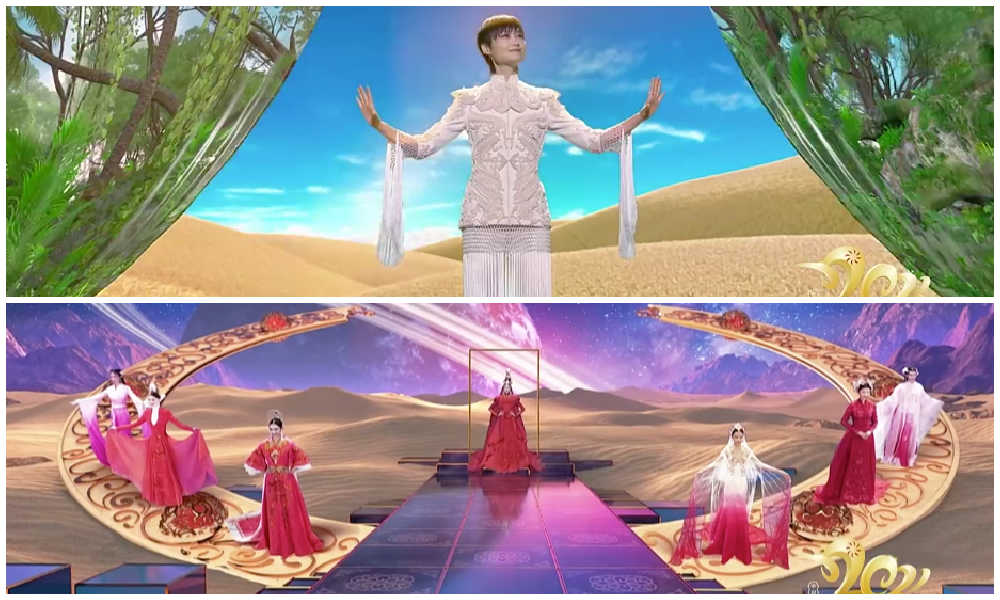
Around 2013, Li Yuchun was one of the most discussed female artists on the Chinese Internet. She was the winner of China’s ‘Supergirl’ TV show and became a national idol and a cultural phenomenon. Due to her androgynous look, Li Yuchun’s stardom led to online discussions on the tomboy trend and sexuality, as she challenged the conventional Chinese criteria for feminine aesthetics and traditional gender norms. It is the third time for Li to participate in the Gala.
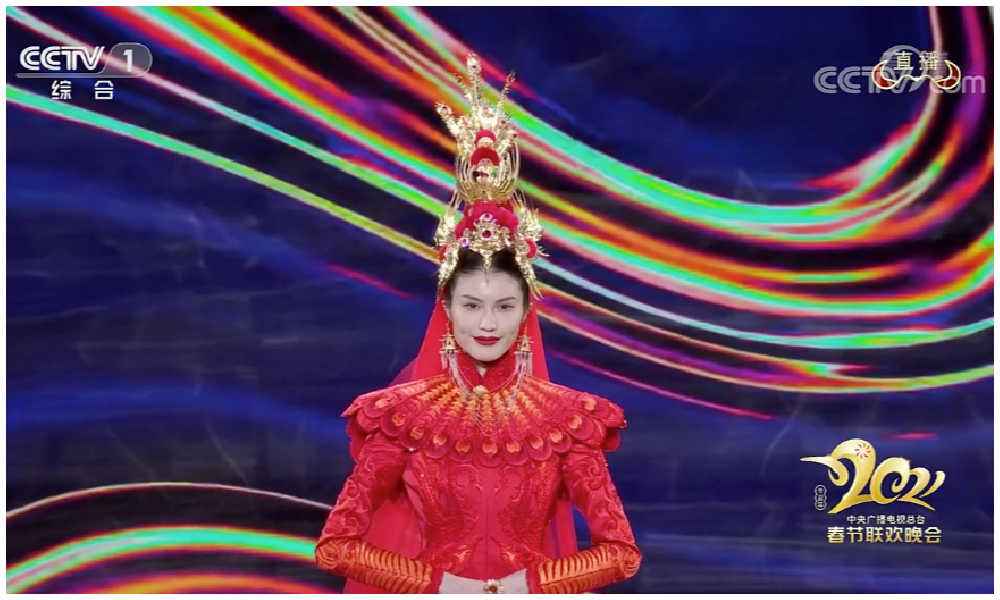
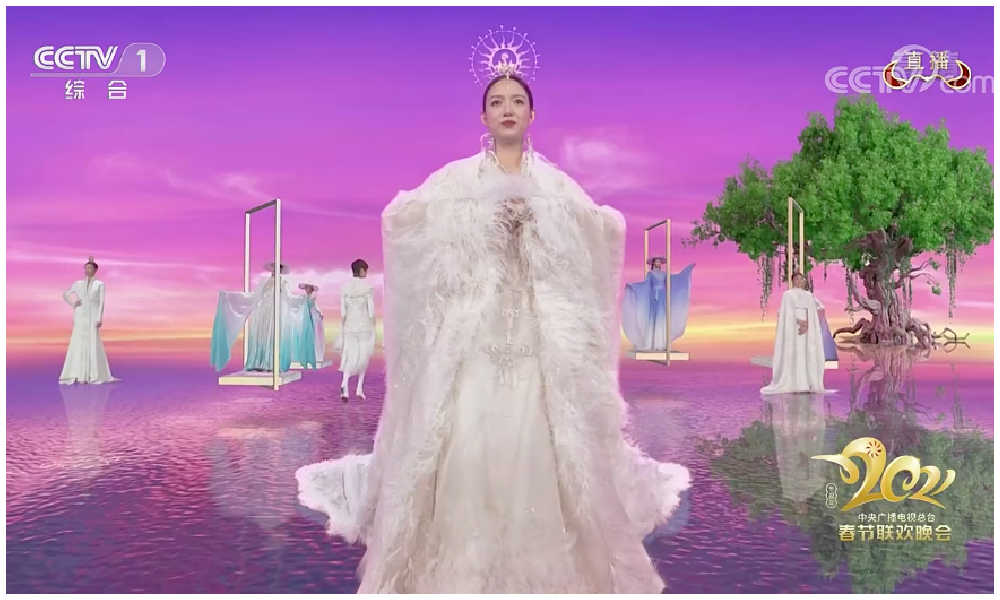
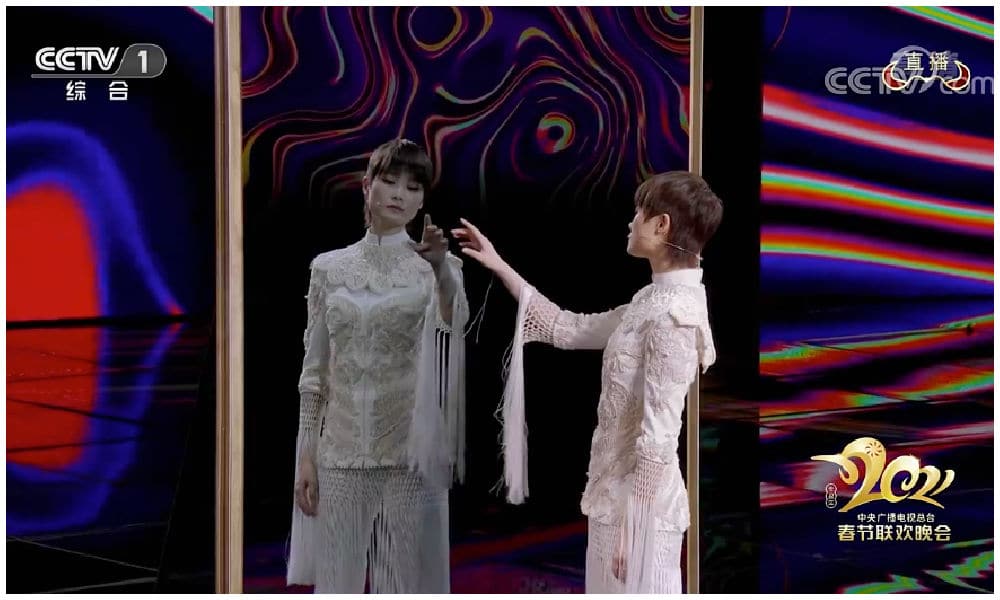



Updated with video link:
——–
如此家长
Feb 11 22:21
Here is another xiangsheng act now with performers Jin Fei (金霏) and Chen Xi (陈曦). The act is about being parents and children’s education.

Some people on Weibo are joking that it’s good that the audience is wearing face masks so nobody has to pretend to laugh when they think the jokes aren’t funny.
Updated with video link:
Link to video of this performance
——–
Relatives – Weibo blowing up!
Feb 11 22:28
This song is super popular, social media is exploding, because superstars Zhang Jie and Yi Yang Qianxi (Jackson Yee) are on stage. Jackson Yee became the youngest member of the Chinese boy band TFBoys in 2013 and is also a solo artist and singer, he has an enormous fanbase on social media.
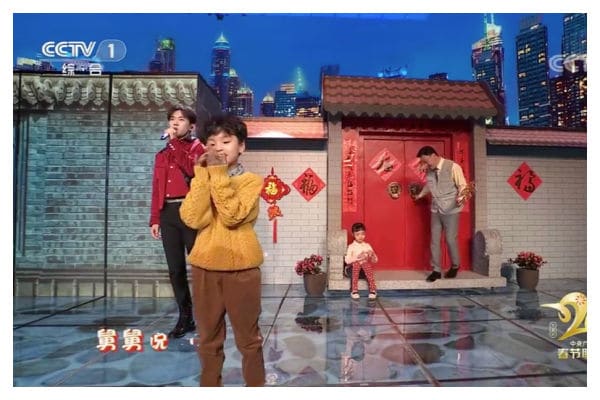

Updated with video link:
Link to video of this performance
——–
Chinese Opera (盛世百花园)
Feb 11 22:38
In comparison to other acts, there are few Chinese Opera acts in the Spring Festival Gala nowadays, but this is an elaborate act that includes many famous names.




Updated with video link:
Link to video of this performance
——–
Lay Zhang Is Here
Feb 11 22:45
This act was among the acts that was discussed the most on social media before the Spring Festival Gala began, because it is Lay Zhang (张艺兴) singing “Picture Scroll” (画卷). Zhang is a Chinese singer-songwriter, music producer, dancer, and actor. He debuted as a member of the South Korean-Chinese boy group Exo.


Updated with video link:
Link to video of this performance
——–
On the Train to Spring
Feb 11 23:07
This performance is called “Towards the Happiness of Spring Days” (开往春天的幸福) and takes place on the high-speed train. The skit has a focus on hard work, duty, and also touches upon China’s rapid developments (the gaotie train, 5G, etc).
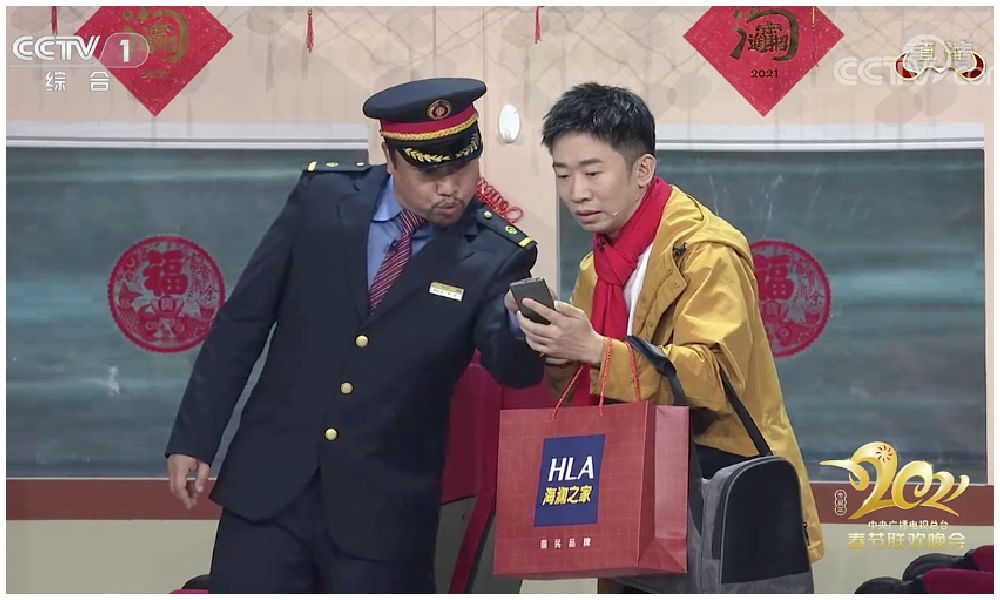
One of the performers in this skit is Chinese actress Ni Ni, who is praised on social media for her slim and pretty body figure.
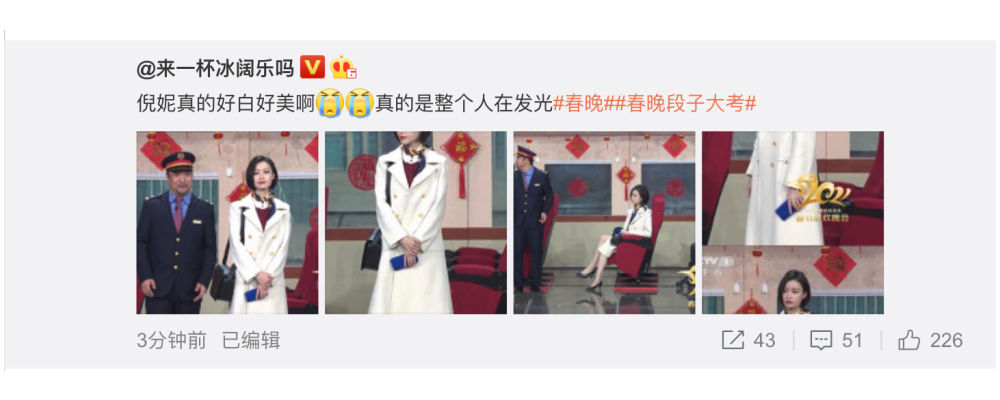
Updated with video link:
Link to video of this performance
——–
Shepherds of Keketuohai
Feb 11 23:07
This song is called “Shepherds of Keketuohai (可可托海的牧羊人) performed by artist Wang Qi (王琪) and actress Luo Wenbo (骆文博). This song was released earlier in 2020.
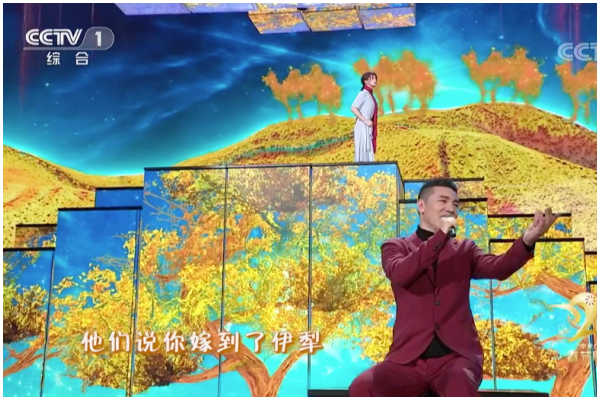
Keketuohai is a national park / scenic area in Xinjiang that has many geological wonders.
Updated with video link:
Link to video of this performance
——–
Pressured to Marry
Feb 11 23:21
“Pressured to Marry Every Holiday” (每逢佳节被催婚) is a skit that focuses on the social pressure many Chinese young people feel, especially during Chinese New Year, when parents and relatives will ask them why they still are not married?! This had led to the phenomenon of people ‘renting’ fake boyfriends or girlfriends to avoid nagging questions, something that is also mentioned in this performance.

Some people on social media actually dread this skit because they are single and pressured, and this doesn’t help!
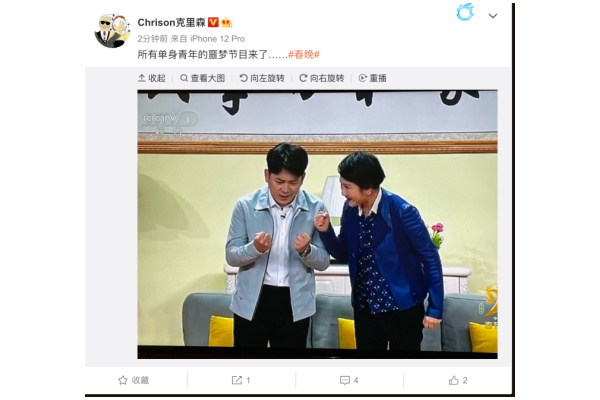
Performed by: Kaili Zhang 张凯丽, Zhang Guoqiang 张国强, Wan Xi 万茜, Ren Jialun 任嘉伦, Wu Hailong 吴海龙, Zhang Weiwei 张维威
Updated with video link:
Link to video of this performance
——–
Children’s Song and Dance
Feb 11 23:32
“Listen to me” is the 22nd act of tonight (we’re not there yet.. still 14 more to go OMG!). This dance is performed by the Air Force Blue Sky Children’s Art Troupe.
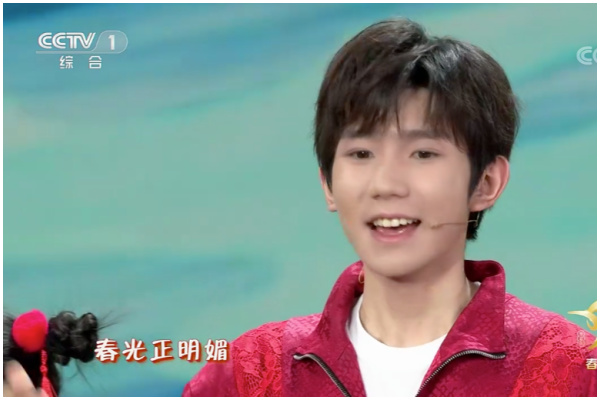
Also on stage are ‘Sister Moon’ and Wang Yuan (Roy Wang), who is known as one of China’s most influential teens, although he is now 20 years old.


Luo Tianyi was also in this performance, a Chinese Vocaloid released by Shanghai Henian Information Technology Co. in 2012. She is the first Vocaloid Chinese singer.

Updated with video link:
——–
Crested Ibis
Feb 11 23:36
Zhu Jiejing (朱洁静) is here with the dance performance Zhuhuan (朱鹮), referring to the Crested ibis (a type of bird).
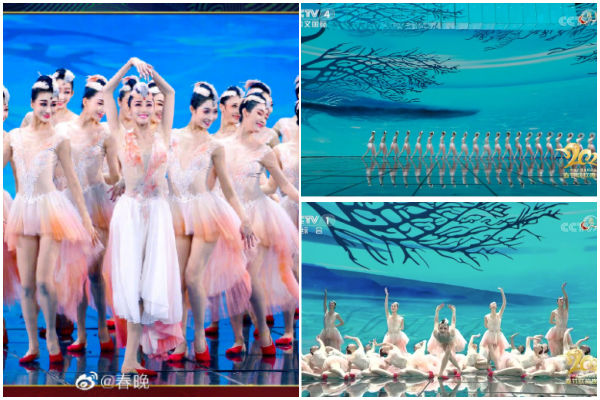
Zhu (1985) is a top dancer in China. She was recruited by Shanghai Dance School at the age of 9 and went on to have a flourishing career.
Updated with video link:
Link to video of this performance
——–
National treasures returning home
Feb 11 23:41
Chinese actor Zhang Guoli is presenting this segment, which is a special part of the program about cultural relics that “return home”, meaning they returned to the mainland from overseas.


The Buddha head that is introduced here was returned from Japan.

The idea behind this “returning to the motherland” segment is of course also symbolical – stressing the importance of the Chinese nation as the (cultural) home.
Updated with video link:
Link to video of this performance
——–
“I love you China”
Feb 11 23:47
An ode to China in this piece titled “I love China’ (我爱你中国), with on piano Li Yundi, the famous concert pianist, and dance by Tan Yuanyuan (Chinese American) and Zhang Aoyue.
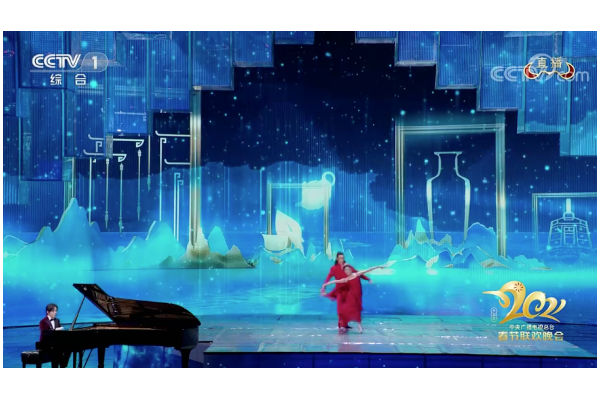
Updated with video link:
Link to video of this performance
——–
Meanwhile on Taobao…
Feb 11 23:49
Meanwhile, the Chunyun is flourishing on e-commerce platform Taobao as well. Some Taobao sellers have managed to collect entire wardrobes of performers worn on stage just now.
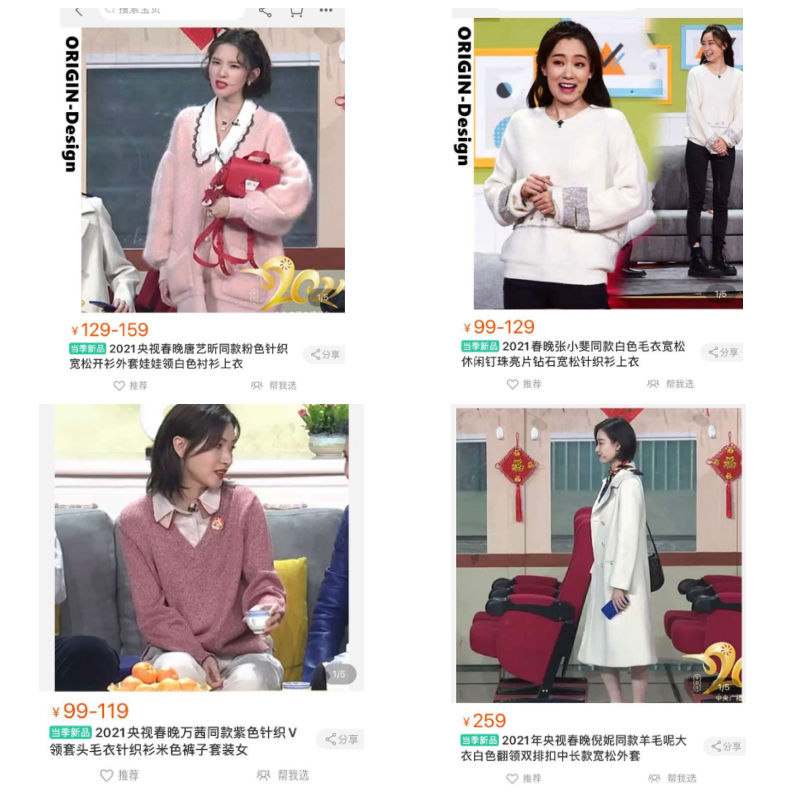
——–
“Be Rest Assured, China”
Feb 11 23:55
China’s military power is the focus in this scene, where Lei Jia sings “Don’t Worry, Homeland” with images of the military in the background.
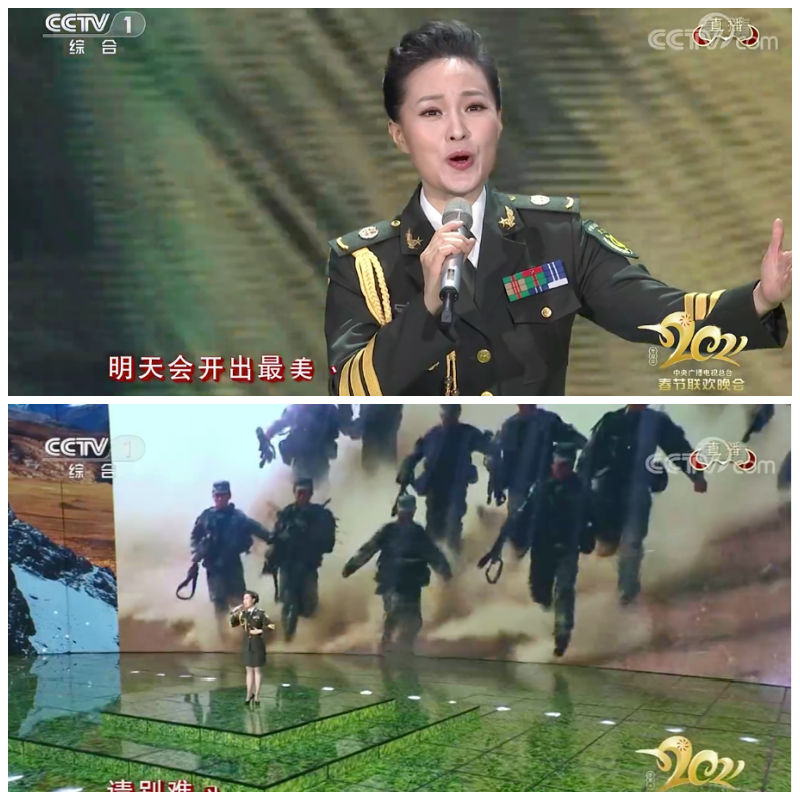
An old-skool show of military power in this song that's titled "Don't Worry Homeland" (请放心吧!祖国) #SpringFestivalGala pic.twitter.com/OjLn2id1JW
— Manya Koetse (@manyapan) February 11, 2021
Updated with video link:
Link to video of this performance
——–
100 Years Communist Party
Feb 11 23:58
This song (唱支山歌给党听) is dedicated to the 100th anniversary of the founding of the CCP.
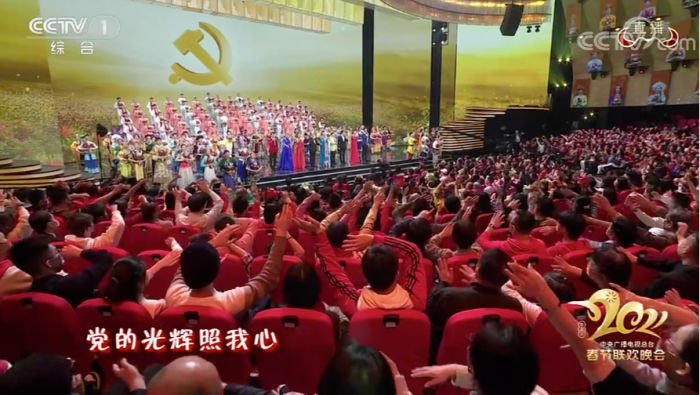
Updated with video link:
Link to video of this performance
——–
HAPPY NIU YEAR!
Feb 11 23:59
While people on social media are complaining their parents are falling asleep, it’s 0:00 in Mainland China. The New Year is here!
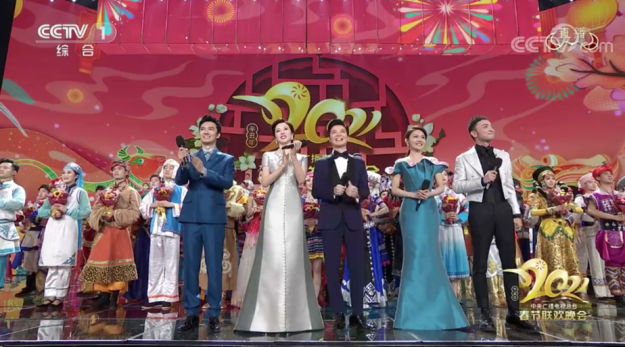
——–
The Big Reunion
Feb 12 00:12
An inescapable part of Chunwan is the moment where everyone gets together and all ethnic groups and age groups and types of performances are thrown out on the stage together. That moment is now. This song is called “All People are One” (万众一心).


Updated with video link:
Link to video of this performance
——–
Silly jokes keep coming
Feb 12 00:12
As we’re entering some of the final acts, some Chinese social media users have found a striking similarity between popstar Huang Zitao and the Buddha head that was just proudly presented on the #SpringFestivalGala as a national treasure returned to the motherland.
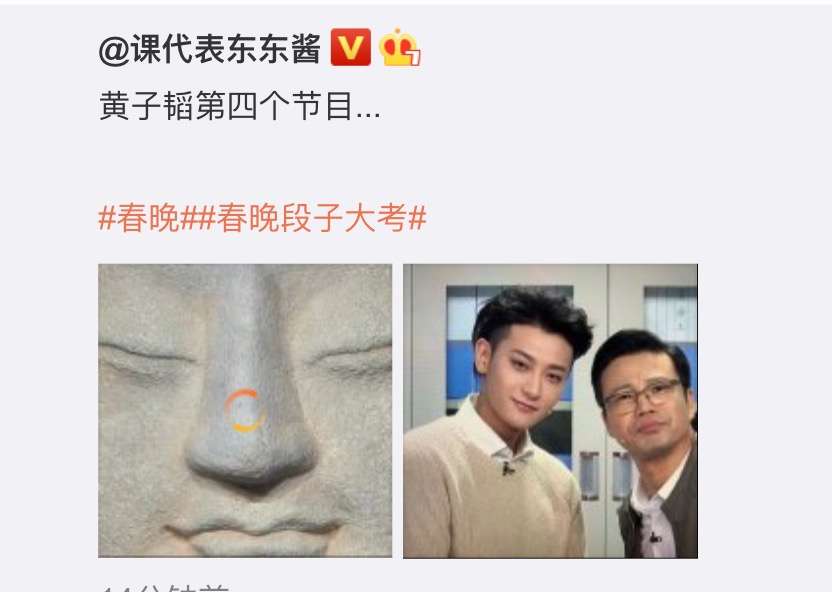
——–
Catching up…
Feb 12 00:18
The final acts of the night are always seemingly going much faster than the first (or we’re getting more tired), so what did we miss? The people you saw earlier were representatives of national medals and national honorary titles, including some people honored in the fight against COVID19.
There was the Peaceful Snow Picture song (瑞雪平安图) featuring Han Xue, Yuan Jiawei, and Wang Junkai – who is hugely popular as a member of the TFBoys.
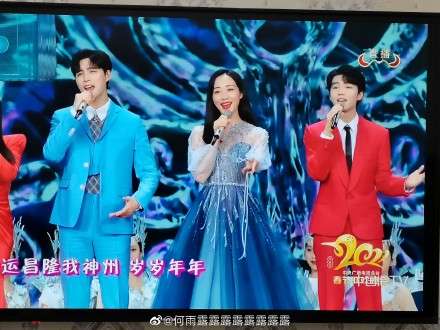
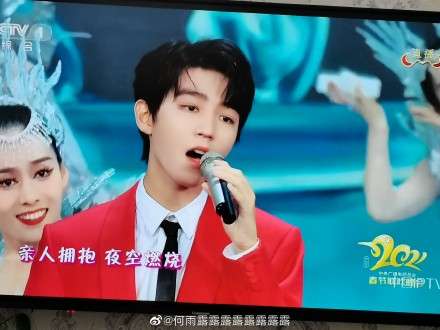
We have now arrived at the xiangsheng act featuring Li Yinfei and Ye Peng.
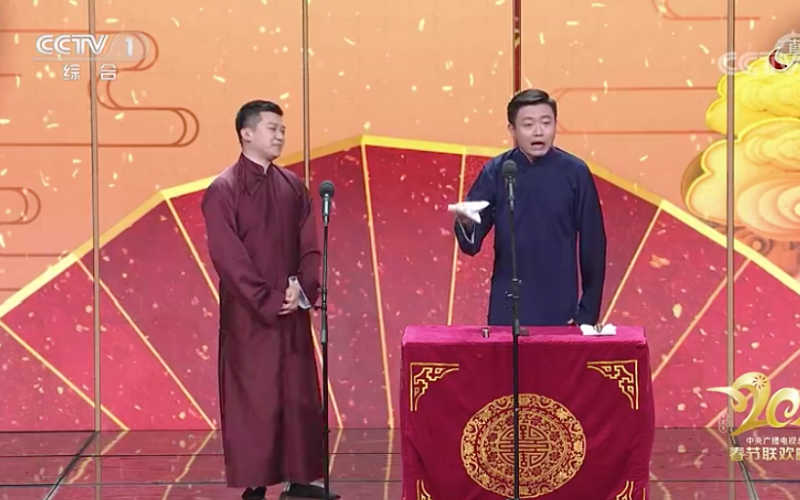
——–
Sun Nan
Feb 12 00:24
Chinese singer Sun Nan is a recurring performer on the Spring Festival Gala. He was also the singer who danced together with 540 robots in an earlier version of the gala.


Updated with video link:
Link to video of this performance
——–
Andrea Bocelli and Matteo Bocelli Sing “Fall on Me”
Feb 12 00:30
These Italian performers joined via ‘cloud’ performance and were not actually in Beijing.

Updated with video link:
Link to video of this performance
——–
Burning Snowflakes/Love is Here (Olympic 2022 Song)
Feb 12 00:37
This performance is called ‘Burning Snowflakes’ (燃烧的雪花) and it is among the acts that was discussed a lot before tonight due to the participation of Yang Mi (1986).

This beautiful actress and singer gained fame and popularity through her various roles in Chinese hit TV dramas. Born in Beijing, Yang already started her acting career at the age of 4. Yang is now seen as one of Chinas biggest actresses, and also as one with the most commercial value; she was listed in the Top 10 Forbes Chinese Celebrities of 2020. And with 110 million fans (!) on her Weibo account, she is one of the most popular social media stars in China.
Also on stage is Chinese actor Liu Ye (刘烨, 1978), who is regarded as one of China’s top actors.

The enormous dancing panda on stage perhaps tells us more on what we can expect for the Winter Olympics in China in 2022.
Updated with video link:
Link to video of this performance
——–
Meanwhile..
Feb 12 00:47
While the show is entering its final phase and Jay Chou is singing Mojito.. (virtual presence via cloud tech, he’s not in the studio)..
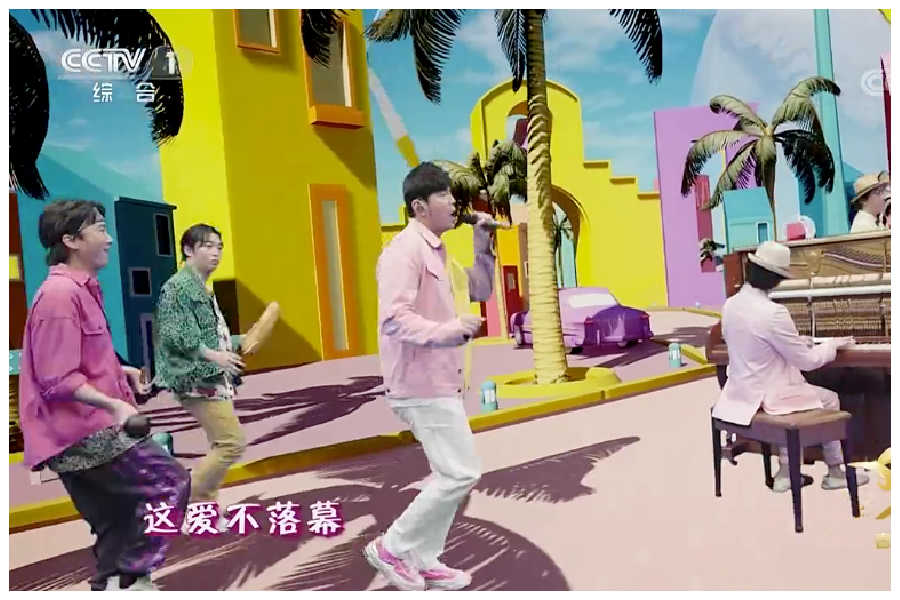
..the news that BBC is no longer allowed to broadcast in mainland China is already called the biggest news of the Chinese New Year.
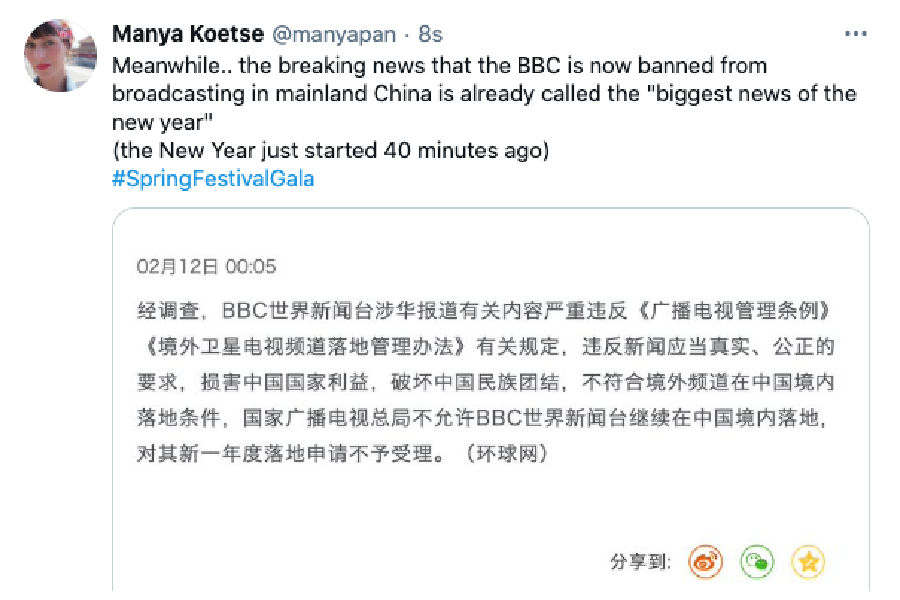
Updated with video links:
Link to video of Jay Chou performance; Link to video of following performance
——–
The Last Dance
Feb 12 00:30
This is the last dance of the night, a dance for ‘good luck’ featuring lead dancers Wang Haitian and Zhou Xu, with a performance by the China Eastern Performing Arts Group.
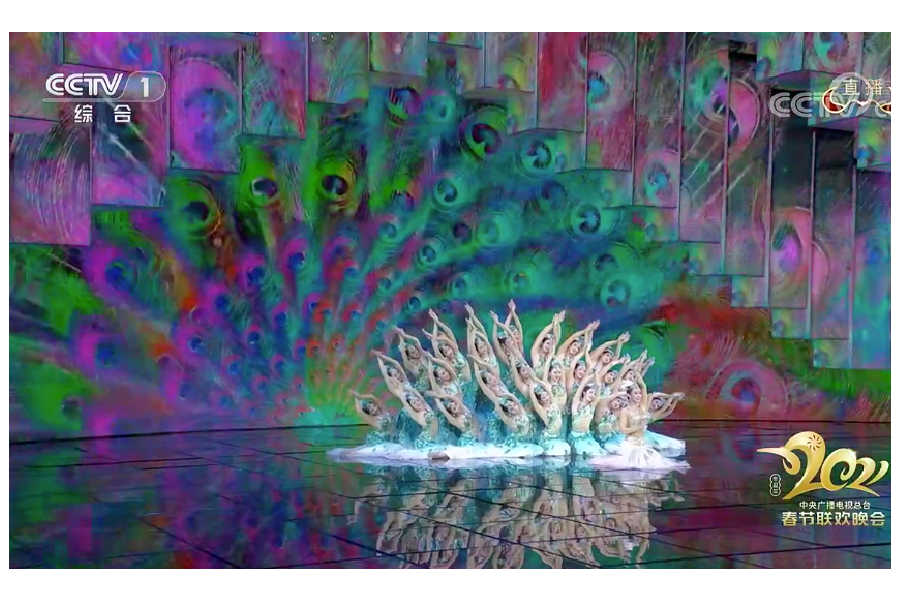
Updated with video link:
Link to video of this performance
——–
Unforgettable Night
Feb 12 00:55
Unforgettable Night! The last song of this night is “Unforgettable Night” (难忘今宵).

It is sung by the senior singer and dancer Li Guyi (李谷一), who became famous with the song ‘Homeland Love’ (乡恋) around the time of China’s Reform and Opening Up – the singer and her songs are nostalgic for many viewers. Li Guyi also appeared at the very first version of the Gala in 1983, and became the singer that sang the most at the event.
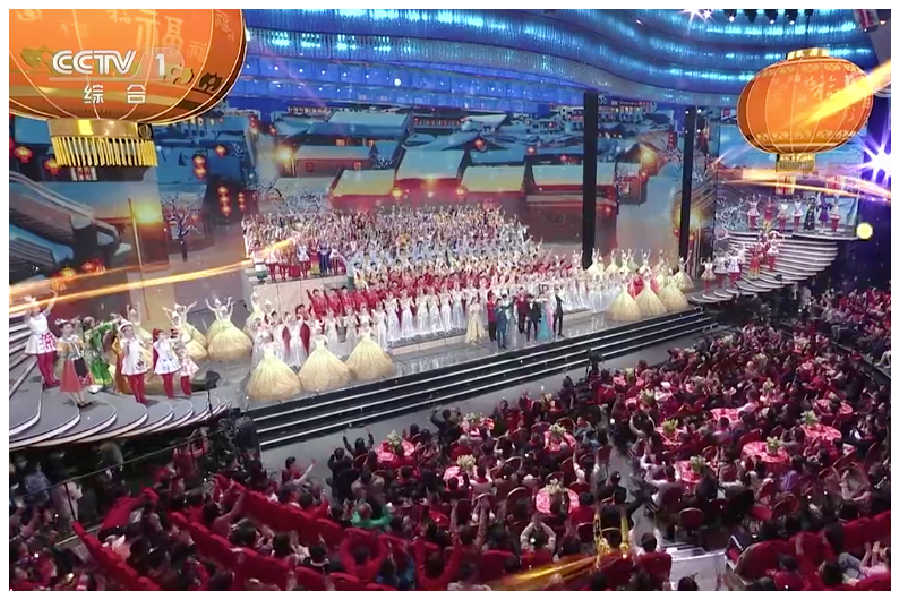
Li Guyi sings the same song every year at the end of this show. The last song ends with all performers of the Beijing venue on stage. The song repeats the phrases 共祝愿 祖国好: let’s all wish together that the country will be good, that it will last long and be prosperous. The hosts wish everyone a happy new year, and much luck for the new year. And so do we! It’s a wrap, happy niu year to you!
Updated with video link:
Link to video of this performance
By Manya Koetse and Miranda Barnes
Follow @whatsonweibo
Spotted a mistake or want to add something? Please let us know in comments below or email us. First-time commenters, please be patient – we will have to manually approve your comment before it appears.
©2021 Whatsonweibo. All rights reserved. Do not reproduce our content without permission – you can contact us at info@whatsonweibo.com.
Stories that are authored by the What's on Weibo Team are the stories that multiple authors contributed to. Please check the names at the end of the articles to see who the authors are.

China ACG Culture
Inside the Labubu Craze and the Globalization of Chinese Designer Toys
Labubu is not ‘Chinese’ at all—and at the same time, it is very much a product of present-day China.
Published
4 days agoon
June 8, 2025
Labubu – the hottest toy of 2025 – is making headlines everywhere these days. The little creature is all over TikTok, and from New York to Bangkok and Dubai, people are lining up for hours to get their hands on the popular keyring doll.
In the UK, the Labubu hype has gone so far that its maker temporarily pulled the toys from all of its stores for “safety reasons,” following reports of customers fighting over them. In the Netherlands, the sole store where fans can buy the toys also had to hire extra security to manage the crowds, and Chinese customs authorities have intensified their efforts to prevent the dolls from being smuggled out of the country.
While the Labubu craze had slightly cooled in China compared to its initial peak, the character remains hugely popular and surged back into the top trending charts with the launch of POP MART’s Labubu 3.0 series in late April 2025 (which instantly sold out).
Following the global popularity of the Chinese game Black Myth: Wukong, state media are citing Labubu as another example of a successful Chinese cultural export—calling it ‘a benchmark for China’s pop culture’ and viewing its success as a sign of the globalization of Chinese designer toys.
But how ‘Chinese’ is Labubu, really? Here’s a closer look at its cultural identity and the story behind the trend.
The Journey to Labubu
In the perhaps unlikely case you have never heard of Labubu, I’ll explain: it’s a keyring toy with a naughty and, frankly, somewhat bizarre face and gremlin-like appearance that comes in various colors and variations. It’s mainly loved by young (Gen Z) women, who like to hang the toys on their bags or just keep them as collectibles.
The figurine is based on a character created by renowned Hong Kong-born artist Kasing Lung (龍家昇/龙家升, born 1972), whose work is inspired by Nordic legends of elves.

Kasung Lung, image via Bangkok Post.
Lung’s story is quite inspirational, and very international.
As a child, Lung immigrated to the Netherlands with his parents. Struggling to learn Dutch, young Kasing was given plenty of picture books. The picture books weren’t just a way to connect with his new environment, it also sparked a lifelong love for illustration.
Among Kasing’s favorite books were Where the Wild Things Are by Maurice Sendak and those by Edward Gorey — all full of fantasy, with some scary elements and artistic quality.
Later, as his Dutch improved, Kasing became an avid reader and turned into a true bookworm. The many fantasy novels and legendary tales he devoured planted the seed for creating his own world of elves and mythical creatures.

Kasing as a young boy on the right, and one of his children’s illustration books on the left.
After initially returning to Hong Kong in the 1990s, Lung later moved back to the Netherlands and eventually settled in Belgium.
Following a journey of many rejections and persistence, he began publishing his own illustrations and picture books for the European market.
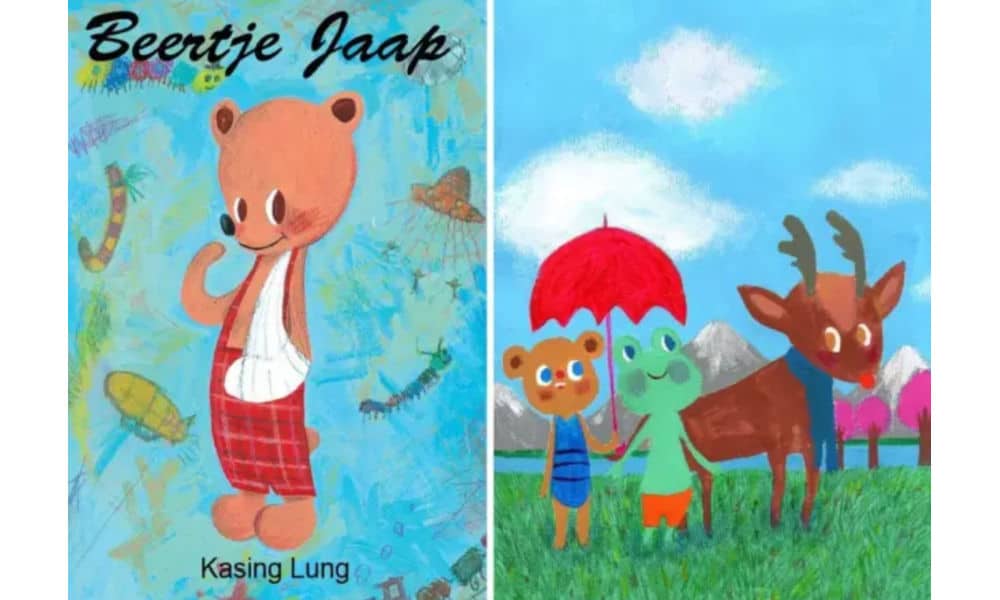
Image via Sina.
In 2010, Hong Kong toy brand How2work’s Howard Lee reached out to Lung. One of How2work’s missions is cultivating creative talent and supporting the Hong Kong art scene. Lee invited Kasung to turn his illustrations into 3D, collectible figurines. Kasung, a collector of Playmobil figures since childhood, agreed to the collaboration for the sake of curiosity and creativity.
Lung’s partnership with How2work marked a transition to toy designer, although Lung also continued to stay active as an illustrator. Besides his own “Max is moe” (Max is tired) picture book, he also did illustrations for a series by renowned Belgian author Brigitte Minne (Lizzy leert zwemmen, Lizzy leert dansen).
A few years later, Lung introduced what would become known as The Monsters Trilogy: a fantasy universe populated by elf-like creatures. Much like The Smurfs, the Monsters formed a tribe of distinct characters, each with their own personalities and traits, led by a tribal leader named Zimomo.
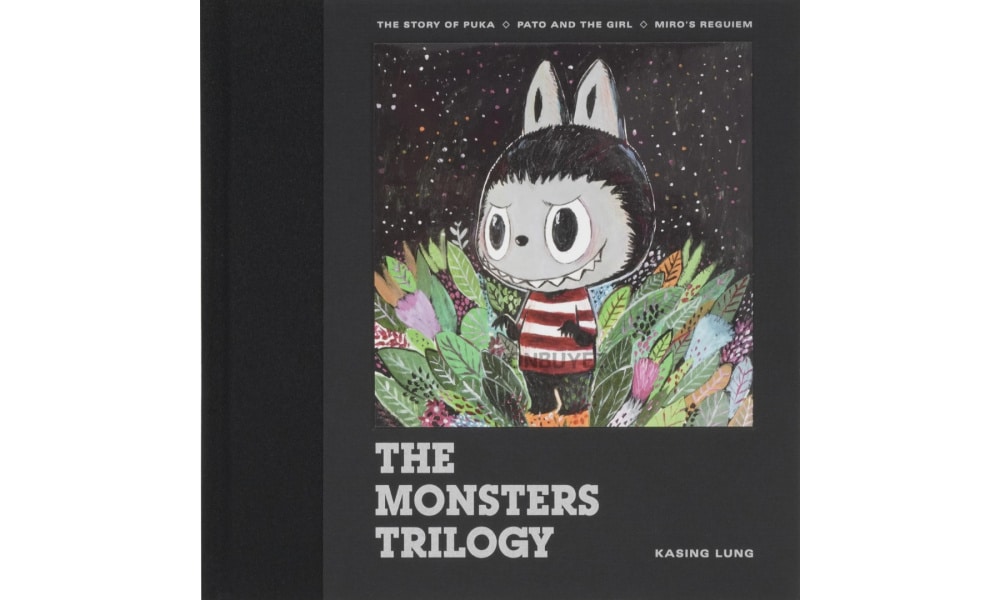
With its quirky appearance, sharp teeth, and mischievous grin, Labubu stood out as one of the long-eared elves.
When Labubu Met POPMART
Although the Labubu character has been around since 2015, it took some time to gain fame. It wasn’t until Labubu became part of POP MART’s (泡泡玛特) toy lineup in 2019 that it began reaching a mass audience.
POP MART is a Chinese company specializing in artsy toys, figurines, and trendy, pop culture-inspired goods. Founded in 2010 by a then college student, the brand launched with a mission to “light up passion and bring joy,” with a particular focus on young female consumers (15-30 age group) (Wang 2023).
One of POP MART’s most iconic art toy characters—and its first major commercial success—is Molly, designed by Hong Kong artist Kenny Wong in collaboration with How2work.
Prices vary depending on the toy, but small figurines start as low as 34 RMB (about US$5), while collectibles can go as high as 5,999 yuan (US$835). Resellers often charge significantly more.

Pop Mart and its first major commercial success: Molly (source).
POP MART is more than just a store, it’s an operational platform that covers the entire chain of trendy toys, from product development to retail and marketing (Liu 2025).
Within a decade of opening it first store in Beijing, POP MART experienced explosive growth, expanded globally, and was listed on the Hong Kong Stock Exchange.
The enormous success of POP MART has been the subject of countless marketing studies, drawing various conclusions about how the company managed to hit such a cultural and commercial sweet spot beyond its mere focus on female Gen Z consumers.
🎁 Gamifying consumption | One common conclusion about the success of POP MART, is that it offers more than just products—it offers an experience. At the heart of the brand is its signature blind box model, where customers purchase mystery boxes from specific product lines without knowing which item is inside. Those who are lucky enough will unpack a special ‘hidden edition.’ Originating in Japanese capsule toy culture, this element of surprise gamifies the shopping experience, makes it more shareable on social media, and fuels the desire to complete collections or hunt for rare figures through repeat purchases.
🌍 Creating a POP MART universe | Although POP MART has partnerships with major international brands such as Disney, Marvel, and Snoopy, it places a strong focus on developing its own intellectual property (IP) toys and figurines. In doing so, POP MART has created a universe of original characters, giving them a life beyond the store through things like collaborations, art shows and exhibitions, and even its own theme park in Beijing.
💖 Emotional consumption | What makes POP MART particularly irresistible to so many consumers is the emotional appeal of its toys and collectibles. It taps into nostalgia, cuteness, and aesthetic charm. The toys become companions, either as a desktop buddy or travel buddy. Much of the toys’ value lies in their role as social currency, driven by hype, emotional gratification, and a sense of social bonding and identity (Ge 2024).
The man behind POP MART and its strategy is founder and CEO Wang Ning (王宁), a former street dance champion (!) and passionate entrepreneur with a clear vision for the company. He consistently aims to discover the next iconic design, something that could actually rival Mickey Mouse or Hello Kitty.
In past interviews, Wang has discussed how consumer values are gradually shifting. The rise of niche toys into the mainstream, he says, reflects this transformation. Platforms like Douyin, China’s strong e-commerce infrastructure, and the digital era more broadly have all contributed to changing attitudes, where people are increasingly buying not for utility, but for the sake of happy moments.
While Wang Ning dreams of a more joyful world, he also knows how to make money (with a net worth of $20.3 billion USD, it was actually just announced that he’s Henan’s richest person now)—every new artist and toy design under POP MART is carefully researched and strategically evaluated before being signed.
Labubu’s journey before its POP MART partnership had already shown its appeal: Kasing Lung and How2Work had built a small but loyal fanbase pre-2019. But it was through the power of POP MART that Labubu really reached global fame.
Labubu: Most Wanted
Riding the wave of POP MART’s global expansion, Labubu became a breakout success, eventually evolving into a global phenomenon and cultural icon.
Now, celebrities around the world are flaunting their Labubus, further fueling the hype—from K-pop star Lisa Manobal to Thai Princess Sirivannavari and Barbadian singer Rihanna.
In China, one of the most-discussed topics on social media recently is the staggering resale price of the Labubu dolls.

Third edition of the beloved Labubu series titled “Big into energy” (Image via Pop Mart Hong Kong).
“The 99 yuan [$13.75] Labubu blind box is being hyped up to 2,600 yuan [$360]” (#99元Labubu隐藏款被炒至2600元#), Fengmian News recently reported.
Labubu collaborations and limited editions are even more expensive. Some, like the Labubu x Vans edition, originally retailed for 599 yuan ($83) and are now listed for as much as 14,800 yuan ($2,055).
Recently, Taiwanese singer and actor Jiro Wang (汪东城) posted a video venting his frustration over scalpers buying up all the Labubus and reselling them at outrageous prices. “It’s infuriating!” he said. “I can’t even buy one myself!” (#汪东城批Labubu黄牛是恶人#).
One Weibo hashtag asks: “Who is actually buying these expensive Labubus?” (#几千块的Labubu到底谁在买#).
Turns out—many people are.
Not only is Labubu adored and collected by millions, an entire subculture has emerged around the toy. Especially in China, where Labubu was famous before, the monster is now entering a new phase: playful customization. Fans are using the toy as a canvas to tell new stories and deepen their emotional connection, transforming Labubu from a collectible into a DIY project.

Labubu getting braces and net outfits – evolving from collectible to DIY project.
There’s a growing trend of dressing Labubu in designer couture or dynastic costumes (Taobao offers a wide array of outfits), but fans are going further—customizing flower headbands, adorning their dolls with tooth gems, or even giving them orthodontic braces for their famously crooked teeth (#labubu牙套#).
In online communities, some fans have gone as far as creating dedicated generative AI agents for Labubu, allowing others to generate images of the character in various outfits, environments, and scenarios.

Labubu AI by Mewpie.
It’s no longer just the POP MART universe—it’s the Labubu universe now.
“Culturally Odorless”
So, how ‘Chinese’ is Labubu really? Actually, Labubu is not ‘Chinese’ at all—and at the same time, it is very much a product of present-day China.
🌍 Not Chinese at all
Like other famous IP characters, from the Dutch Miffy to Japan’s Pikachu and Hello Kitty, Labubu is “culturally odorless,” a term used to refer to how cultural features of the country of invention are absent from the product itself.
The term was coined by Japanese scholar Koichi Iwabuchi to describe how Japanese media products—particularly in animation—are designed or marketed to minimize identifiable Japanese cultural traits. This erasure of “Japaneseness” helped anime (from Astro Boy to Super Mario and Pokémon) become a globally appealing and commercially successful cultural export, especially in post-WWII America and beyond.
Moreover, by avoiding culturally or nationally specific traits, these creations are placed in a kind of fantasy realm, detached from real-world identities. Somewhat ironically, it is precisely this neutrality that has made Japanese IPs so distinctively recognizable as “Japanese” (Du 2019, 15).
Many Labubu fans probably also don’t see the toy as “Chinese” at all—there are no obvious cultural references in its design. Its style and fantasy feel are arguably closer to Japanese anime than anything tied to Chinese identity.
When a Weibo blogger recently argued that Labubu’s international rise represents a more powerful example of soft power than DeepSeek, one popular reply asked: “But what’s Chinese about it?”
🇨🇳 Actually very Chinese
Yet, Labubu is undeniably a product of today’s China—not necessarily because of Kasing Lung (Hong Kong/Dutch/Belgian) or How2work (Hong Kong), but because of the Beijing-based POP MART.
Wang Ning’s POP MART is a true product of its time, inspired by and aligned with China’s new wave of digital startups. From Bytedance to Xiaohongshu and Bilibili, many of China’s most innovative companies move beyond horizontal product offerings or traditional service goals. Instead, they think vertically and break out of the box—evolving into entire ecosystems of their own. (Fun fact: the entrepreneurs behind these companies were all born in the 1980s, between 1983 and 1989).
In that sense, state media like People’s Daily calling Labubu “a benchmark of China’s pop culture” isn’t off the mark.
Still, some marketing critics argue there’s room for more ‘Chineseness’ in Labubu and POP MART’s brand-building strategies—particularly through collections inspired by Chinese heritage, which could further promote national culture on the global stage (Wang 2023).
Meanwhile, Chinese official channels have already begun positioning Labubu as a cultural ambassador. In the summer of 2024, a life-sized Labubu doll embarked on a four-day tour of Thailand to celebrate the 50th anniversary of China–Thailand diplomatic relations.

The life-sized mascot of a popular Chinese toy character, Labubu, visited Bangkok landmarks and was named “Amazing Thailand Experience Explorer” to boost Chinese tourism. Photo Credit: Facebook/Pop Mart, via TrvelWeekly Asia.
In the future, Labubu, just like Hello Kitty in Japan, is likely to become the face of more campaigns promoting tourism and cross-cultural exchange.
Whatever happens next, it’s undeniable that Labubu stands at the forefront of a breakthrough moment for Chinese designer toys in the global market, and, from that position, serves as a unique ambassador for a new wave of Chinese creative exports that resonate with international audiences.
For now, most Labubu fans, however, don’t care about all of that – they are still on the hunt for the next little monster, and that’s enough to keep the Labubu hype burning.🔥
By Manya Koetse
(follow on X, LinkedIn, or Instagram)
References (other sources included in hyperlinks)
• Du, Daisy Yan. 2019. Animated Encounters: Transnational Movements of Chinese Animation, 1940-1970s. Honolulu: University of Hawaii Press.
• Ge, Tongyu. 2024. “The Role of Emotional Value of Goods in Guiding Consumer Behaviour: A Case Study Based on Pop Mart.” Proceedings of the 5th International Conference on Education Innovation and Philosophical Inquiries. DOI: 10.54254/2753-7048/54/20241623.
• Liu, Enyong. 2025. “Analysis of Marketing Strategies of POP MART,” Proceedings of the 3rd International Conference on Financial Technology and Business Analysis DOI: 10.54254/2754-1169/149/2024.
• Wang, Zitao. 2023. “A Case Study of POP MART Marketing Strategy.” Proceedings of the 2023 International Conference on Management Research and Economic Development. DOI: 10.54254/2754-1169/20/
Spotted a mistake or want to add something? Please let us know in comments below or email us. First-time commenters, please be patient – we will have to manually approve your comment before it appears.
©2025 Whatsonweibo. All rights reserved. Do not reproduce our content without permission – you can contact us at info@whatsonweibo.com.
China ACG Culture
10 Viral Chinese Phrases You Didn’t Know Came From Video Games
Gaming lingo isn’t just for players — it’s become part of modern-day Chinese language.
Published
2 weeks agoon
May 27, 2025
China has a thriving gaming culture with far-reaching impact — not just on pop culture, but on language too. Even those who aren’t into gaming inevitably use expressions that come from it. RealTime Mandarin’s Andrew Methven explains.
It might be an unexpected source, but online gaming has had a significant impact on the evolution of modern Chinese slang. Words and expressions that once appeared in gaming chat rooms or livestreams have made their way into mainstream media, business headlines, and even government rhetoric.
Let’s take one recent news story as an example: the ongoing competition between Chinese tech giants JD.com (京东) and Meituan (美团), where headlines describe the rivalry using the term “PK.”
📰 “JD “PK” Meituan: Who will dominate the trillion-yuan instant retail market?” (“京东PK美团,谁能主宰万亿即时零售市场”)
The term “PK” stands out because it’s not Chinese characters. “PK” is one of those Chinese phrases which originated from online gaming—from an imported video game—and is now common in spoken language and news coverage.
The phrase began life in the early 1990s, when text-based online games were popular in China. Those early computer games were mainly imports, and with them came the English language gaming slang.
“PK” originally was how player deaths were described in these games, meaning a “Player Kill”, to be killed by another in-game player, as opposed to a non-player character.
“Player Kill” morphed into “PK”, which is much easier to pronounce for Chinese speakers, and became common in Chinese language gameplay.
The term made its way into daily language, originally as a noun, and later evolved into a verb, with different meanings depending on context, such as to “challenge”, “defeat”, “kill”, or “eliminate”.
In the context of the battle between JD and Meituan, “PK” in the title of the news story can be translated as “vs”, “challenges” or “battles”.
“PK” is just one of many modern slang terms in Chinese which have come from online gaming, some of which we’ll share below.
But before that, even more surprising, is which games these phrases come from.
Most phrases come from a small number of blockbuster foreign games popular in China. The three main ones are:
- League of Legends (英雄联盟): developed by Riot Games, entered China in 2011 through Tencent (China’s largest gaming company).
- World of Warcraft (魔兽世界), released in 2004, entered China in 2005 under NetEase, another top gaming company in China.
- Dota 2 (刀塔), the full title is Defense of the Ancients 2, which was developed by Valve and launched in 2013 and localised for the China market by Perfect World (完美世界) in the same year.
In more recent years, two homegrown Chinese video games have also generated more online slang phrases which have then gone mainstream:
- Honour of Kings (王者荣耀), is one of the most popular mobile multiplayer online battle arena games in China, developed by Tencent, released in 2015
- Black Myth: Wukong (黑神话:悟空) is an action role-playing game developed by the Chinese studio, Game Science. Released in 2024, Black Myth is China’s most successful video game ever.
Of these two, Honour of Kings has became so popular that it has its own slang title: “pesticide”.
The word for pesticide in Chinese is “农药” (nóng yào), which has a similar pronunciation to the word for “honour” (荣耀 róng yào) from the game’s title. So the game is jokingly called “pesticide” by its fans.
In more recent years, the term “pesticide” has taken on a darker tone, meaning the gaming industry as a whole. It’s often used in government narratives pejoratively to draw attention to the negatives of gaming, as a poisonous “spiritual opium” (精神鸦片).
Despite official pushback—including limits on how many hours children can play online each day, restrictions on gaming companies, and increasingly negative rhetoric—online games still play an important role in everyday life and language in China today.
So here’s a top 10 trending internet slang words you probably did not know came from online gaming (these have also been featured in previous Realtime Mandarin episodes).
TWO-CHARACTER PHRASES:
1. 氪金 kè jīn
🔍 “Spending virtual money” — over-spending online, or being tricked into online purchases
👉 氪金的实质是一种炫耀性消费,粉丝凭借大量氪金的经济实力攀爬权力阶梯
Spending virtual cash is a kind of ‘show off consumerism’ – the more fans spend the higher they climb within fan groups.
📝Background: In the gaming context, this means “in-game purchasing” or paying for virtual goods in online games. This term was popularised by the phrase, “24K Pay-to-win Dog Eyes” (24K氪金狗眼), where “氪金” means spending large amounts of money on rare in-game items. In mainstream Chinese it means spending lots of money online, and even being conned into online or in-app purchases.
Source: World of Warcraft (魔兽世界)
In context: Gaming stocks lose $80 billion in one day
2. 冲塔 chōng tǎ
🔍 “Attack the tower” — challenge or protest against those in authority
👉 通过在公司内网“冲塔”的方式声援该名员工
Other employees showed solidarity with her through protesting on the company’s internal web.
📝Background: This literally means “charging the tower”. In gaming it refers to a reckless move where a player, not yet strong enough, attacks a defense tower, often resulting in their own defeat. As an internet slang it means “asking for trouble” and now describes provocative actions or statements that challenge authority or censorship.
Source: League of Legends (英雄联盟)
In context: Our favourite phrases of 2021
3. 上头 shàng tou
🔍 “Gone in the head” — obsessed, addicted
👉 这个产品会上瘾,太有毒、上头了
This product is very addictive, users have become obsessed.
📝Background: In gaming lingo, this describes a moment of impulsiveness or being irrational, and a situation where a player, after achieving several kills, becomes over confident, ignores potential risks, and charges ahead—usually resulting in their death. In modern Chinese, the phrase has come to describe any impulsive or irrational behaviour driven by emotion or excitement, and even to become addicted to something.
Source: Defence of the Ancients 2 (刀塔 2)
In context: Catching Sheep: A new computer game with an old format takes off
4. 团灭 tuán miè
🔍 “Total wipeout” — complete or total failure
👉 最坏的情况下,储能在美国的业务会被“团灭”
In the worst-case scenario, the energy storage business in the U.S. will be totally wiped out.
📝Background: In gaming this means the complete defeat of an entire team during a group battle or raid, where all members are killed. In modern Chinese it describes any collective failure or complete annihilation of a group, sector, or even industry.
Source: World of Warcraft (魔兽世界), League of Legends (英雄联盟)
In context: China’s exporters are feeling the pain
5. 破防 pò fáng
🔍 “Guard break” — emotionally overwhelmed
👉 网友们瞬间集体破防
Netizens were instantly overwhelmed.
📝Background: Originally from fighting games, this phrase’s direct translation is “guard break”, which means to break through an opponent’s defences (“破” means “break”; “防” means “defences”). As a modern internet slang, it means to be emotionally overwhelmed, to burst into tears, or to feel devastated. It’s normally used humorously or in an exaggerated way. The phrase became so popular it was voted one of China’s top internet slang phrases in 2023.
Source: Unknown
In context: Crashing stock markets, 31 July
6. 秒杀 miǎo shā
🔍 “Instant kill” — totally wiped out, flash sale, to snap up
👉 最近频繁刷到烤全羊秒杀套餐的钱怡,考虑再三过后还是被这个超低价给劝退了
Recently, Qian Yi kept seeing flash sale deals for whole roasted lamb, but she was discouraged by the ultra-low price after much thought.
📝Background: The direct meaning is to “kill in seconds” (“秒” is “seconds; “杀” is to “kill”). In gaming it means to kill an opponent or a monster in an instant, using a single skill or physical attack. As a mainstream slang phrase, it can mean something similar, to beat, overwhelm, or wipeout a competitor in a very short time. It has more recently evolved into a common phrase heard in livestream e-commerce broadcasts, where products are sold within a short time period—which translates as “flash sale”.
Source: Red Moon (红月)
In context: Meituan “group take-out” boom signals shifting consumer habits
THREE-CHARACTER PHRASES:
7. 带节奏 dài jié zòu
🔍 “Set the tempo” — to mislead public opinion (against the interests of China)
👉 不能由个别国家的单边主义给整个世界“带节奏”
We must not let the rules set by one or a few countries be imposed on others, or allow unilateralism pursued by certain countries to set the pace for the whole world (against the interests of China).
📝Background: Originally translated as “set the tempo”, this phrase was first popularised by game commentators as they described how experienced players would take the lead, organise their team, and execute coordinated attacks—which was known as “starting a wave of tempo” (“带一波节奏”). Over time, the term expanded beyond gaming into broader internet slang. It even made its way into official Chinese government rhetoric, used by its “Wolf Warrior” diplomats to mean “steering or influencing public opinion against the interests of China.”
Source: Defence of the Ancients 2 (刀塔2)
In context: Our favourite phrases of 2021
8. 拉仇恨 lā chóu hèn
🔍 “Pull hatred” — to attract criticism, or provoke resentment
👉 丁太升其实不是第一个骂的,只不过这人确实自带流量,也自带拉仇恨属性
Ding Taisheng is actually not the first one to criticise the song, but he has a big profile and what he says attracts a lot of criticism.
📝Background: This original meaning is when a player deliberately draws attention from and attacks by monsters in a game, by increasing their own “aggro” or “hate”. In these games, monsters choose their targets based on each player’s level of hate—the higher the level, the more likely a player is to be attacked. So in team battles, one teammate intentionally “pulls aggro” (拉仇恨) to draw the enemy’s attention, allowing others coordinate their attacks while the enemy is distracted. In modern Chinese, this is now commonly used to describe people who provoke resentment or jealousy—such as flaunting a romantic relationship, or showing off wealth or superiority.
Source: Unknown
In context: Pop singer is too tacky
9. 血槽姐 xuě cáo jiě
🔍 “Blood bar sister” — elites who abuse power and privilege for personal gain
👉 昨天开始,一位来自上海的余小姐,因为遭遇一场严重车祸后逃出生天,而火遍全网,进而竟获封“血槽姐”这个让人浑身不适的称号
Since yesterday, Miss Yu, a woman from Shanghai, has gone viral across the internet after surviving a severe car accident. She has since been given the disturbing nickname “Blood Bar Sister”
📝Background: The health bar, or “blood bar” (血槽 xuě cáo) in Chinese, first appeared in the 1978 arcade game Space Invaders (太空侵略者). The first graphical health bar emerged in the 1980 game Space Warrior (太空战士). Since then, the “health bar” has been a key feature in many games, offering a visual on a character’s health. The term “health bar” became part of a viral meme in November 2023, following a scandal involving a woman who became known as “blood bar sister” (血槽姐), after she shared a video online explaining how she used a powerful relative to force local officials in the Tibetan region of Ali to donate blood to her following her injury in a car crash. The “Blood Bar Sister” meme has since evolved into a more general term, representing the abuse of power and the over privilege of China’s elite.
In context: ‘Sister Blood Points’ Controversy
10. 黑神话 hēi shén huà
🔍 “Black myth” — legendary, a stunning or sector-leading success
👉 胖东来这家河南本土超市,早已成了商超领域的“黑神话” –
Pangdonglai, this local supermarket from Henan, has already become a legendary success in grocery retail.
📝Background: This is a reference to the title of China’s most successful video game ever, Wukong: Black Myth, which was released in August 2024. Its popularity was so great that the phrase “black myth” (黑神话) has taken on its own meaning as a stunning or “legendary” success of a product or company in a particular sector, which has shot to fame out of nowhere.
Source: Black Myth: Wukong
In context: Local shopping mall builds national brand
Other gaming phrases you should know:
As well as these ten phrases, all of which have now entered mainstream use, there are many more common Chinese phrases which have come from video games. Including:
● PK pī kēi — to battle
● GG gī gī — I’m done for, or it’s over
● 完爆 wán bào — totally outperform
● 农药 nóng yào — poisonous computer games (“pesticides”)
● 开挂 kāi guà — achieving something amazing or unbelievable
● 毒奶 dú nǎi – when positive words backfire
● 满血复活 mǎn xuě fù huó — significant recovery in physical or mental state
● 6666 (溜溜溜溜) liù liù liù liù — awesome, well played
So now you know—these expressions, along with many others, are Chinese “hot internet slang phrases” (网络热词) that originated in video games and have since entered widespread mainstream use.
If you want to ‘level up,’ subscribe to RealTime Mandarin, the resource to help you bridge the gap to real-world fluency, stay informed about China, and communicate with confidence in Mandarin.
By Andrew Methven
Ps—When you’re ready, there’s only one way to keep up with latest slang and lingo coming out of China every week…Join our membership, RTM Plus! It’s a self-paced program offering weekly news-based content through newsletters and podcasts, along with app integrations and tailored resources.
Members also receive personalised onboarding, one-month check-ins, and ongoing support. Find out what’s inside RTM Plus here.
Spotted a mistake or want to add something? Please let us know in comments below or email us. First-time commenters, please be patient – we will have to manually approve your comment before it appears.
©2025 Whatsonweibo. All rights reserved. Do not reproduce our content without permission – you can contact us at info@whatsonweibo.com.
Subscribe

Inside the Labubu Craze and the Globalization of Chinese Designer Toys

Lured with “Free Trip”: 8 Taiwanese Tourists Trafficked to Myanmar Scam Centers

10 Viral Chinese Phrases You Didn’t Know Came From Video Games

Earring Gate: Huang Yangdiantian and the 2.3 Million RMB Emerald Earrings

Guming’s 1 Yuan Ice Water: China’s Coolest Summer Trend

China Is Not Censoring Its Social Media to Please the West

IShowSpeed in China: Streaming China’s Stories Well

China Reacts: 3 Trending Hashtags Shaping the Tariff War Narrative

US-Russia Rapprochement and “Saint Zelensky”: Chinese Online Reactions to Trump’s Shake-Up

Chinese New Nickname for Trump Mixes Fairy Tales with Tariff War

Squat or Sit? China’s Great Toilet Debate and the Problem of Footprints on the Seat

China Trending Week 15/16: Gu Ming Viral Collab, Maozi & Meigui Fallout, Datong Post-Engagement Rape Case

Strange Encounter During IShowSpeed’s Chengdu Livestream

No Quiet Qingming: From High-Tech Tomb-Sweeping to IShowSpeed & the Seven China Streams

From Trade Crisis to Patriotic Push: Chinese Online Reactions to Trump’s Tariffs
Get in touch
Would you like to become a contributor, or do you have any tips or suggestions? Get in touch here!
Popular Reads
-

 China Media11 months ago
China Media11 months agoA Triumph for “Comrade Trump”: Chinese Social Media Reactions to Trump Rally Shooting
-

 China Society8 months ago
China Society8 months agoDeath of Chinese Female Motorcycle Influencer ‘Shigao ProMax’ Sparks Debate on Risky Rides for Online Attention
-

 China Memes & Viral11 months ago
China Memes & Viral11 months agoThe “City bu City” (City不City) Meme Takes Chinese Internet by Storm
-

 China Society11 months ago
China Society11 months agoHero or Zero? China’s Controversial Math Genius Jiang Ping

